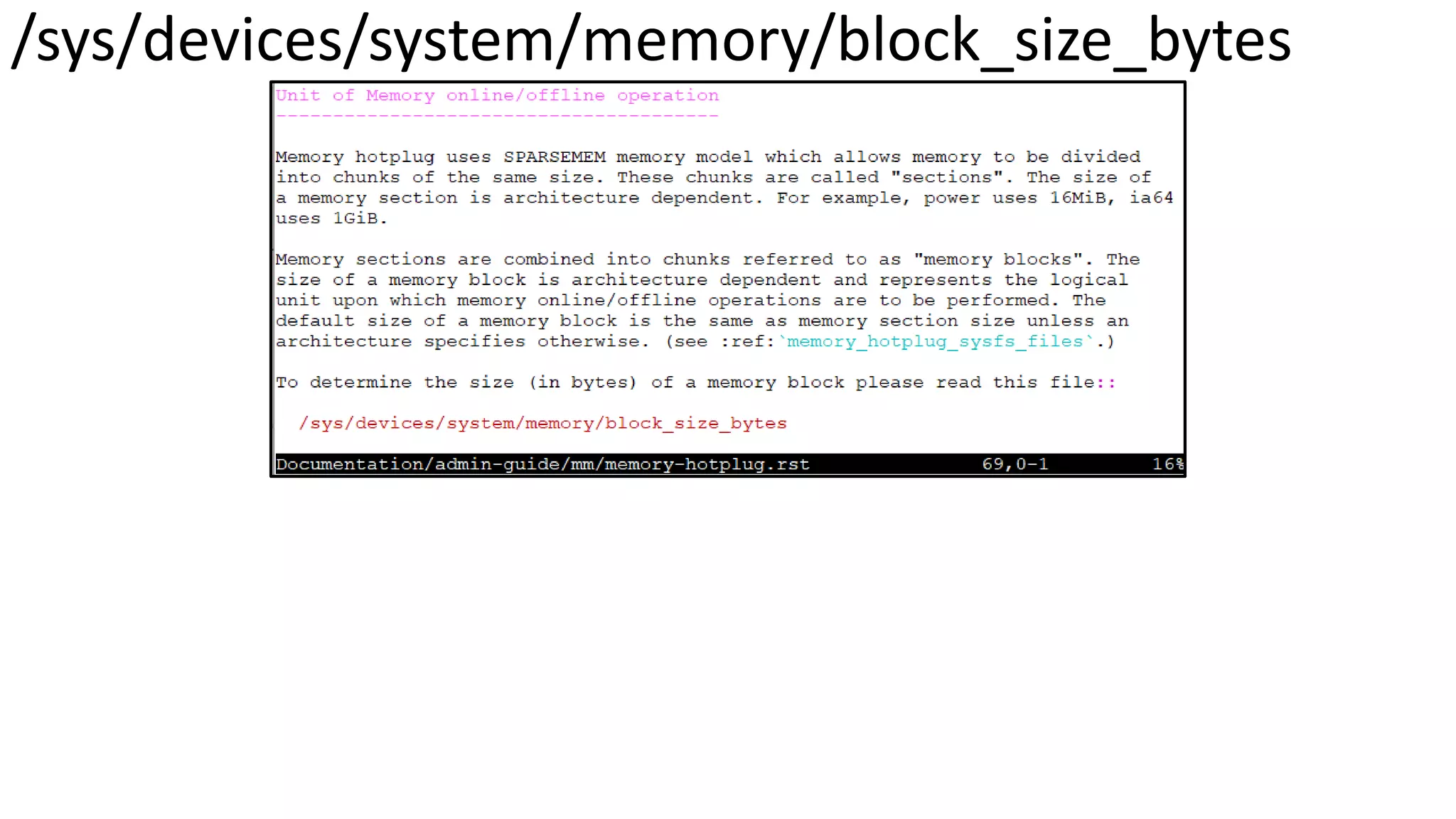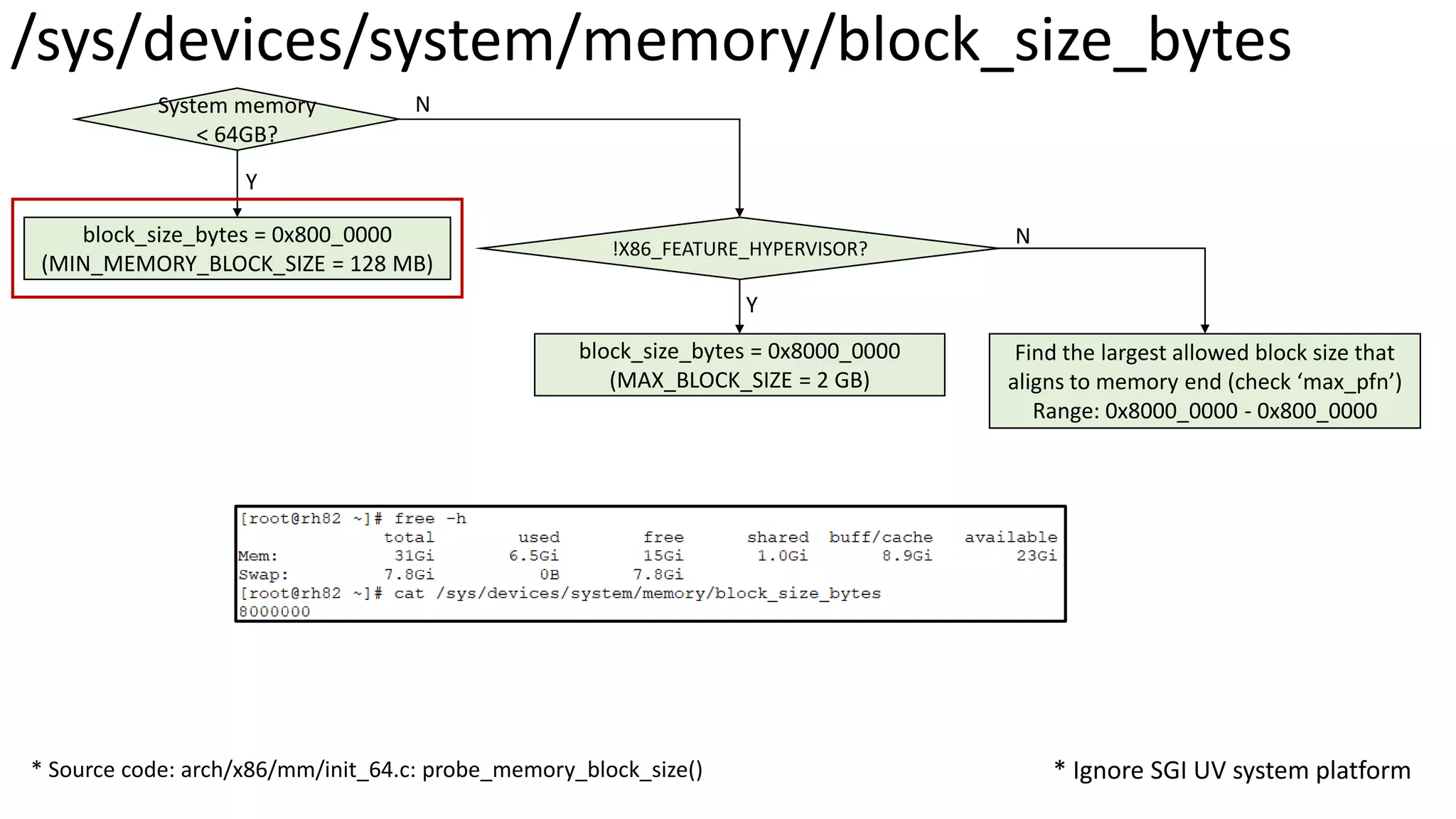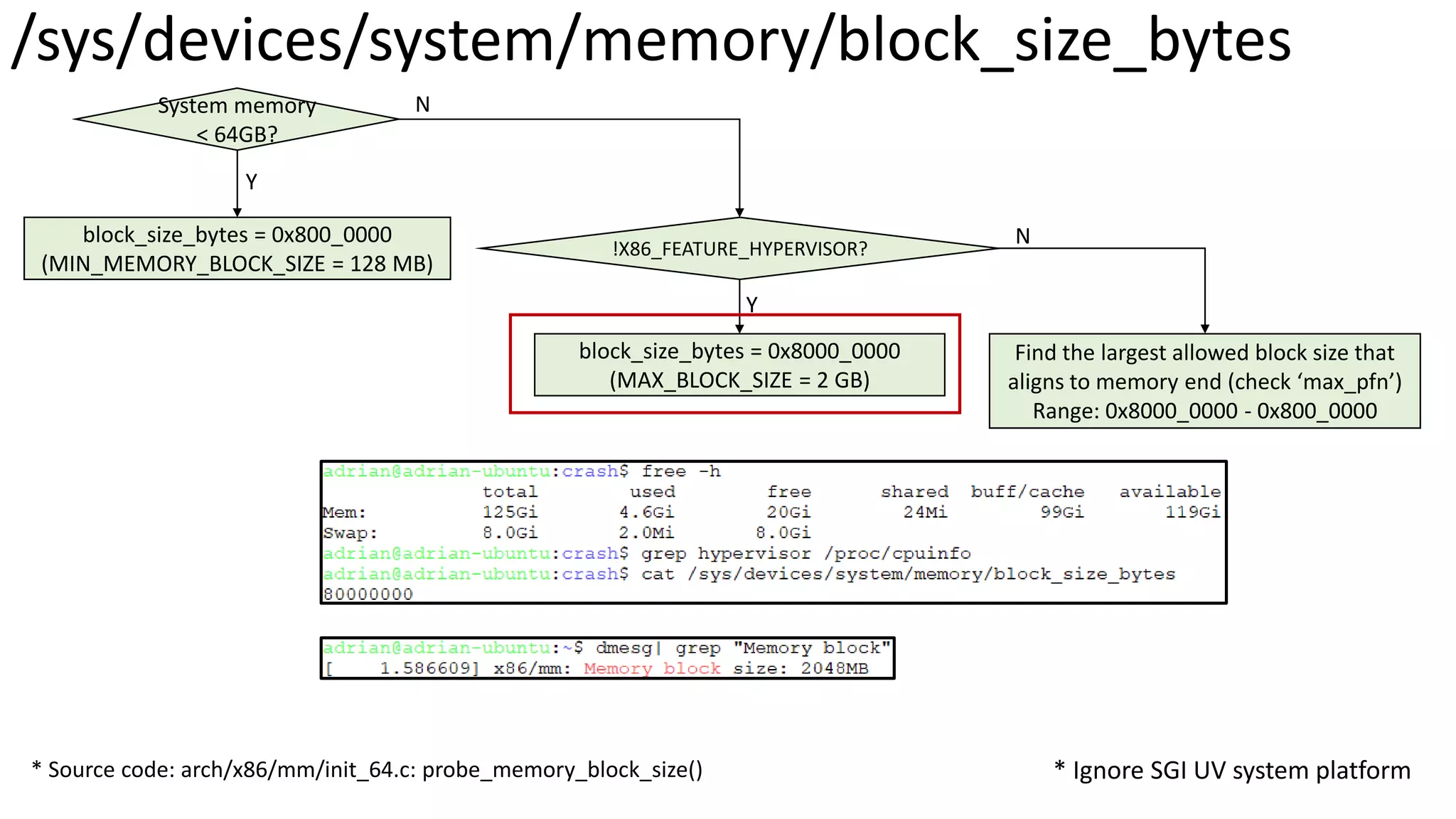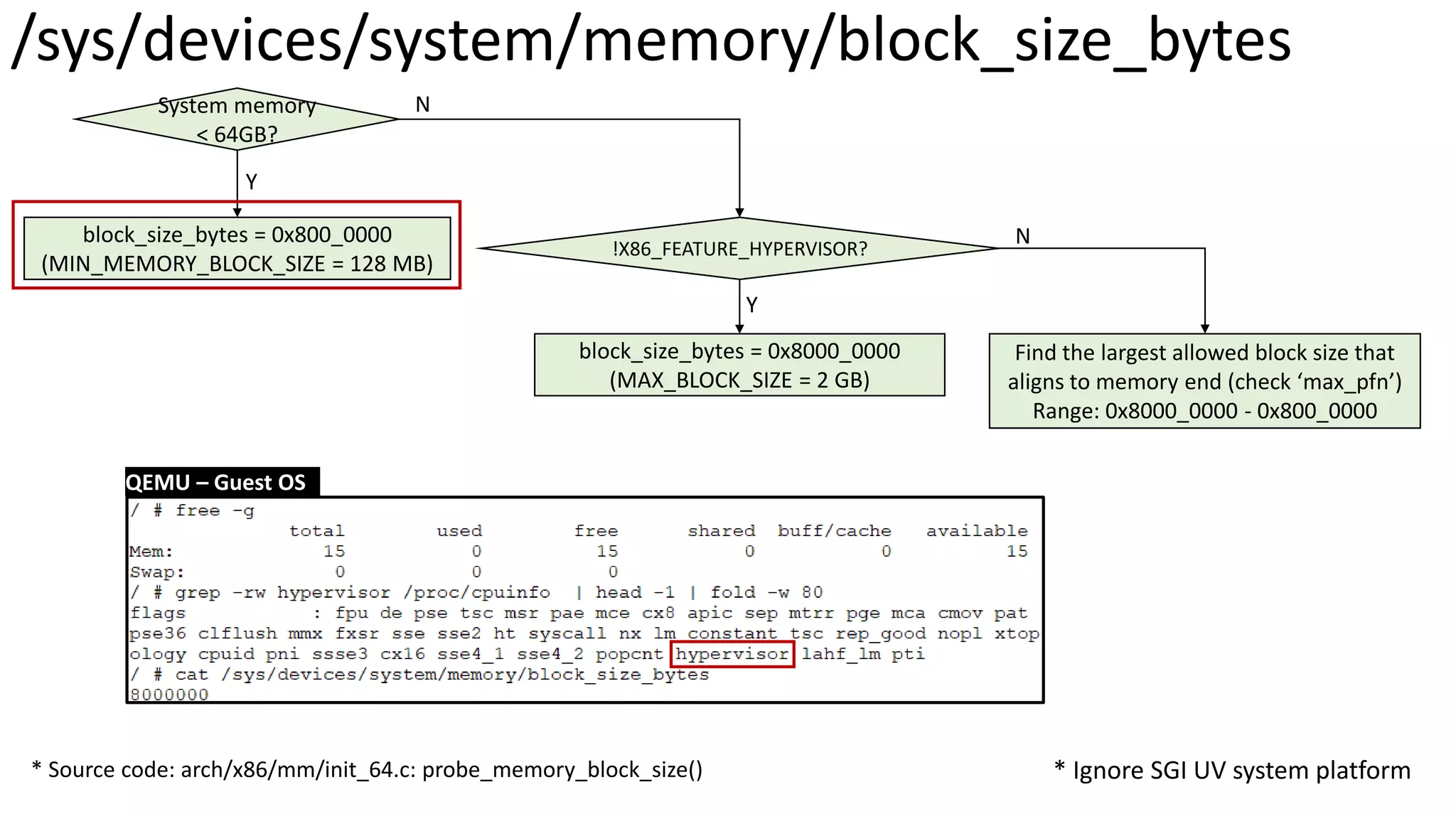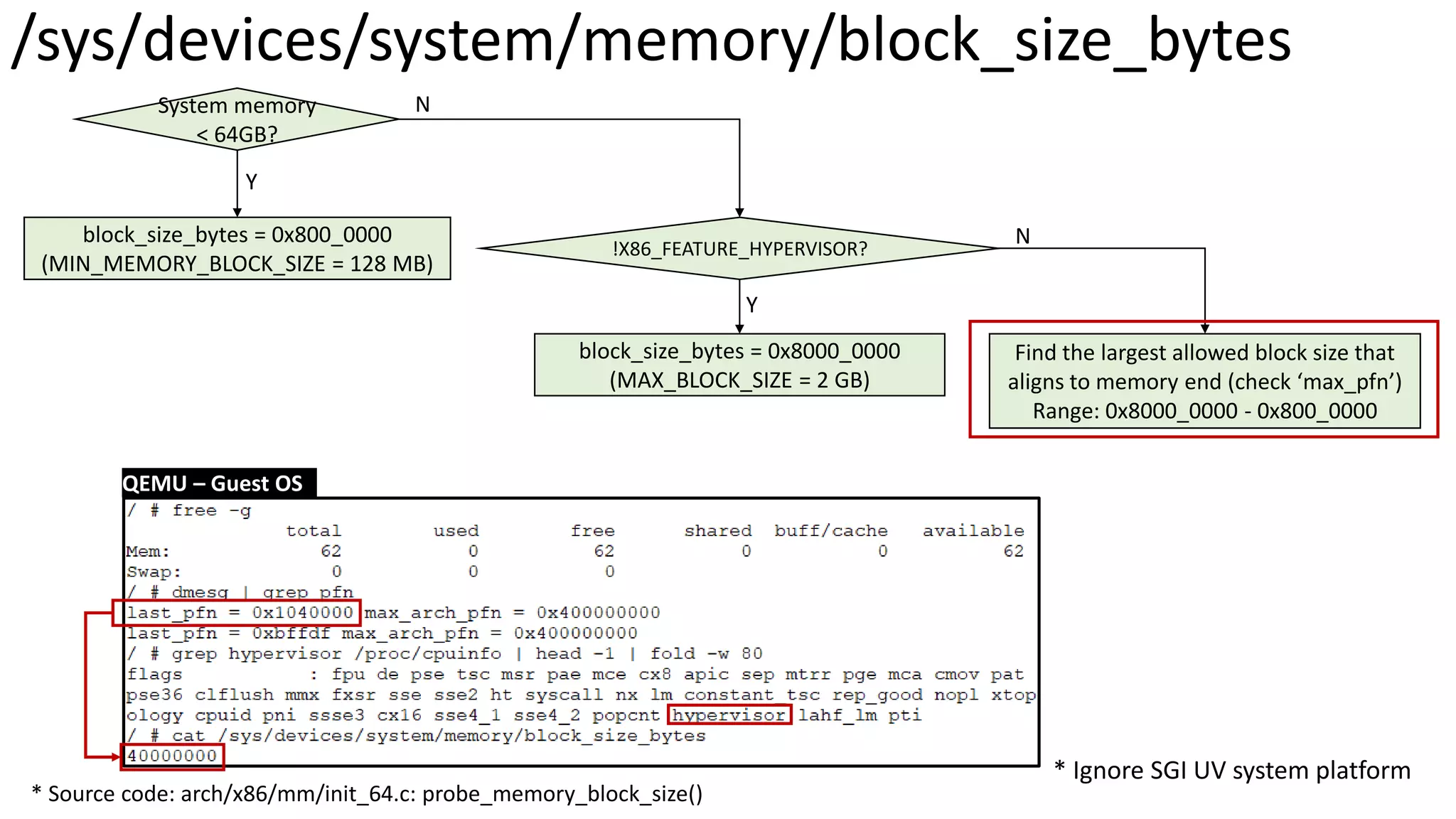The document discusses four physical memory models in Linux: flat memory model, discontinuous memory model, sparse memory model, and sparse memory virtual memmap. It describes how each model addresses physical memory (page frames) and maps them to page descriptors. The sparse memory model is currently used, using memory sections to allocate page structures and support memory hotplug. It initializes by walking memory ranges from memblocks and allocating/initializing mem_section data structures.



![Memory Model – Flat Memory
struct page #n
....
struct page #1
struct page #0
Dynamic page structure
(Kernel Virtual Address Space)
struct page *mem_map
page frame #n
....
page frame #1
page frame #0
Physical Memory
Note
Page structure array
(Kernel Virtual Address Space)
1. [mem_map] Dynamic page structure: pre-allocate all page structures based on the number of page frames
✓ Allocate/Init page structures based on node’s memory info (struct pglist_data)
▪ Refer from: pglist_data.node_start_pfn & pglist_data.node_spanned_pages
2. Scenario: Continuous page frames (no memory holes) in UMA
3. Drawback
✓ Waste node_mem_map space if memory holes
✓ does not support memory hotplug
4. Check kernel function alloc_node_mem_map() in mm/page_alloc.c](https://image.slidesharecdn.com/physicalmemorymodels-220620070231-42aa9f6d/75/Physical-Memory-Models-pdf-4-2048.jpg)
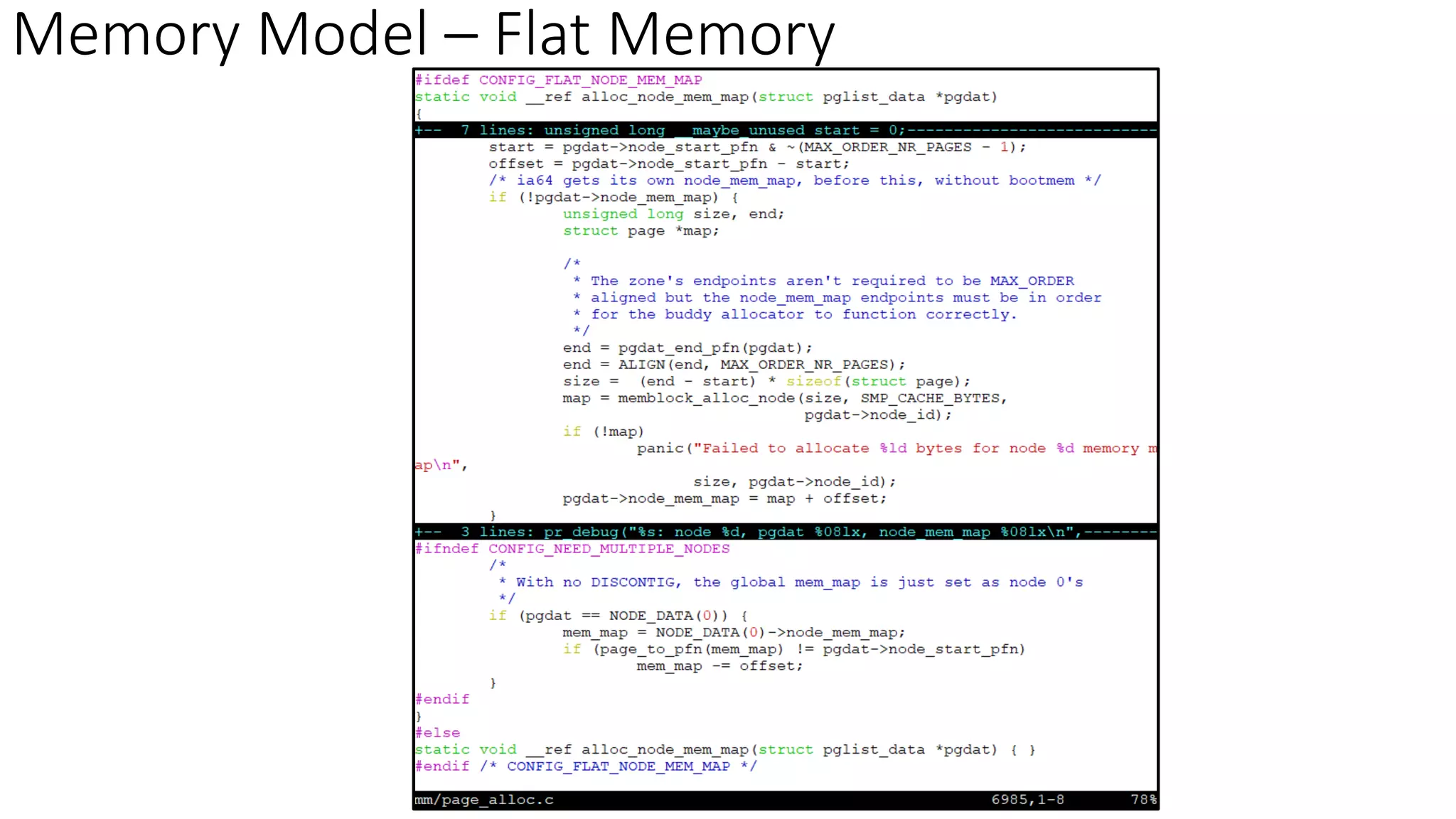
![Memory Model – Discontinuous Memory
struct pglist_data *
page frame #000
....
page frame #1000
Physical Memory
1. [node_mem_map] Dynamic page structure: pre-allocate all page structures based on the
number of page frames
✓ Allocate/Init page structures based on node’s memory info (struct pglist_data)
▪ Refer from: pglist_data.node_start_pfn & pglist_data.node_spanned_pages
2. Scenario: Each node has continuous page frames (no memory holes) in NUMA
3. Drawback
✓ Waste node_mem_map space if memory holes
✓ does not support memory hotplug
NUMA Node Structure
(Kernel Virtual Address Space) struct pglist_data *
struct pglist_data *
…
struct pglist_data *node_data[]
page frame #999
....
page frame #0
struct page #n
....
struct page #0
struct page #n
....
struct page #0
node_mem_map
node_mem_map Node #1
Node #0
Note](https://image.slidesharecdn.com/physicalmemorymodels-220620070231-42aa9f6d/75/Physical-Memory-Models-pdf-6-2048.jpg)
![Memory Model – Sparse Memory
struct mem_section
page frame
....
page frame
Physical Memory
**mem_section
struct mem_section
struct mem_section
…
struct mem_section *
page frame
....
page frame
....
struct page #0
struct page #n
....
struct page #0
Node #1
(hotplug)
Node #0
…
struct mem_section *
1. [section_mem_map] Dynamic page structure: pre-allocate page structures based on the
number of available page frames
✓ Refer from: memblock structure
2. Support physical memory hotplug
3. Minimum unit: PAGES_PER_SECTION = 32768
✓ Each memory section addresses the memory size: 32768 * 4KB (page size) = 128MB
4. [NUMA] : reduce the memory hole impact due to “struct mem_section”
Note
struct page #m+n-1](https://image.slidesharecdn.com/physicalmemorymodels-220620070231-42aa9f6d/75/Physical-Memory-Models-pdf-7-2048.jpg)
![struct mem_section
page frame
....
page frame
Physical Memory
struct mem_section
struct mem_section
…
struct mem_section *
page frame
....
page frame
struct page #m+n-1
....
struct page #m
struct page #n
....
struct page #0
Node #1
Node #0
…
struct mem_section *
Memory Model – Sparse Memory Virtual Memmap
vmemmap
Memory Section
(two-dimension array)
Note
1. [section_mem_map] Dynamic page structure: pre-allocate page structures based on the number of
available page frames
✓ Refer from: memblock structure
2. Support physical memory hotplug
3. Minimum unit: PAGES_PER_SECTION = 32768
✓ Each memory section addresses the memory size: 32768 * 4KB (page size) = 128MB
4. [NUMA] : reduce the memory hole impact due to “struct mem_section”
5. Employ virtual memory map (vmemmap/ vmemmap_base) – A quick way to get page struct and pfn
6. Default configuration in Linux kernel](https://image.slidesharecdn.com/physicalmemorymodels-220620070231-42aa9f6d/75/Physical-Memory-Models-pdf-8-2048.jpg)
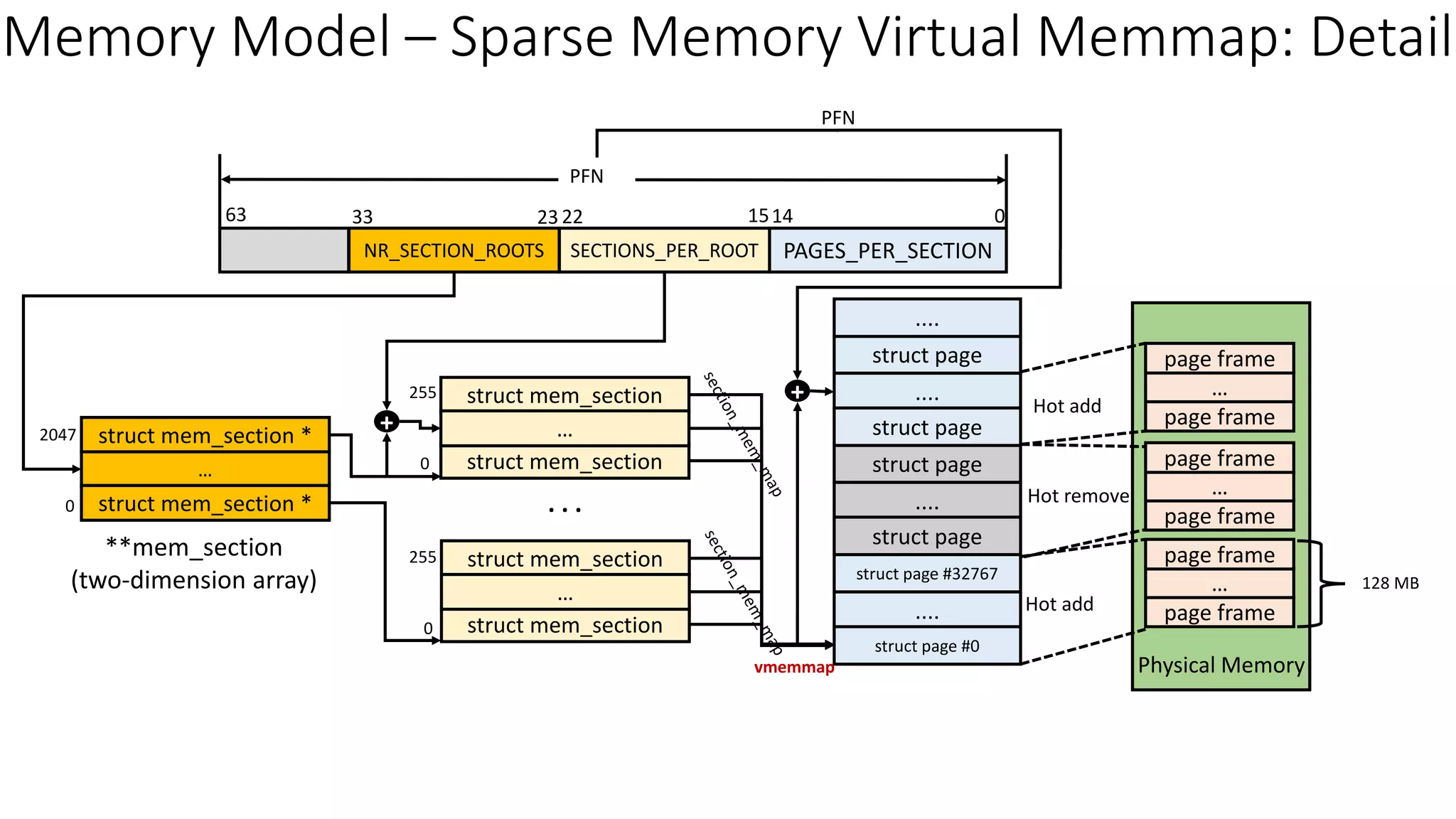


![How to know available memory pages in a system?
BIOS e820 memblock Zone Page Frame Allocator
e820__memblock_setup() __free_pages_core()
[Call Path] memblock frees available memory space to zone page frame allocator
Zone page allocator detail will be discussed in another session:
physical memory management](https://image.slidesharecdn.com/physicalmemorymodels-220620070231-42aa9f6d/75/Physical-Memory-Models-pdf-12-2048.jpg)

![x86 - setup_arch() -- init_mem_mapping() – Page Table
Configuration for Direct Mapping
init_mem_mapping
probe_page_size_mask
setup_pcid
memory_map_top_down(ISA_END_ADDRESS, end)
init_memory_mapping(0, ISA_END_ADDRESS, PAGE_KERNEL)
init_range_memory_mapping(start, last_start)
split_mem_range
kernel_physical_mapping_init
add_pfn_range_mapped
early_ioremap_page_table_range_init [x86 only]
load_cr3(swapper_pg_dir)
__flush_tlb_all
init_memory_mapping() -> kernel_physical_mapping_init()
• Create 4-level page table (direct mapping) based on
‘memory’ type of memblock configuration.
split_mem_range()
• Split different the groups of page size based on the input
memory range (start address and end address)
✓ Try larger page size first
▪ 1G huge page -> 2M huge page -> 4K page
while (last_start > map_start)
init_memory_mapping(start, end, PAGE_KERNEL)
for_each_mem_pfn_range() → memblock stuff](https://image.slidesharecdn.com/physicalmemorymodels-220620070231-42aa9f6d/75/Physical-Memory-Models-pdf-14-2048.jpg)
![Page Table Configuration for Direct Mapping
Kernel Space
0x0000_7FFF_FFFF_FFFF
0xFFFF_8000_0000_0000
128TB
Page frame direct
mapping (64TB)
ZONE_DMA
ZONE_DMA32
ZONE_NORMAL
page_offset_base
0
16MB
64-bit Virtual Address
Kernel Virtual Address
Physical Memory
0
0xFFFF_FFFF_FFFF_FFFF
Guard hole (8TB)
LDT remap for PTI (0.5TB)
Unused hole (0.5TB)
vmalloc/ioremap (32TB)
vmalloc_base
Unused hole (1TB)
Virtual memory map – 1TB
(store page frame descriptor)
…
vmemmap_base
64TB
*page
…
*page
…
*page
…
Page Frame
Descriptor
vmemmap_base
page_ofset_base = 0xFFFF_8880_0000_0000
vmalloc_base = 0xFFFF_C900_0000_0000
vmemmap_base = 0xFFFF_EA00_0000_0000
* Can be dynamically configured by KASLR (Kernel Address Space Layout Randomization - "arch/x86/mm/kaslr.c")
Default Configuration
Kernel text mapping from
physical address 0
Kernel code [.text, .data…]
Modules
__START_KERNEL_map = 0xFFFF_FFFF_8000_0000
__START_KERNEL = 0xFFFF_FFFF_8100_0000
MODULES_VADDR
0xFFFF_8000_0000_0000
Empty Space
User Space
128TB
1GB or 512MB
1GB or 1.5GB Fix-mapped address space
(Expanded to 4MB: 05ab1d8a4b36) FIXADDR_START
Unused hole (2MB) 0xFFFF_FFFF_FFE0_0000
0xFFFF_FFFF_FFFF_FFFF
FIXADDR_TOP = 0xFFFF_FFFF_FF7F_F000
Reference: Documentation/x86/x86_64/mm.rst
Note: Refer from page #5 in the slide deck Decompressed vmlinux: linux kernel initialization from page table configuration perspective](https://image.slidesharecdn.com/physicalmemorymodels-220620070231-42aa9f6d/75/Physical-Memory-Models-pdf-15-2048.jpg)
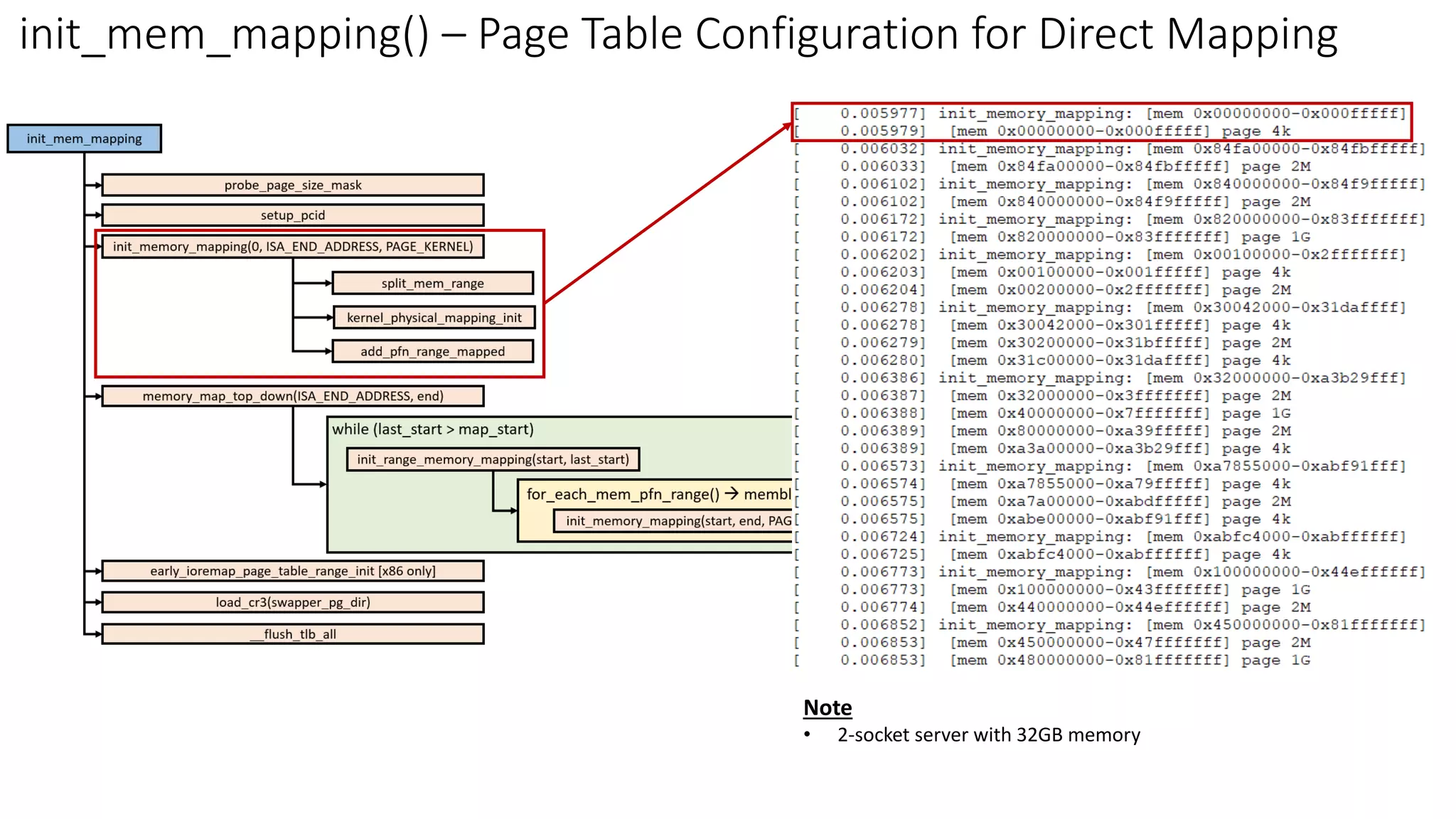
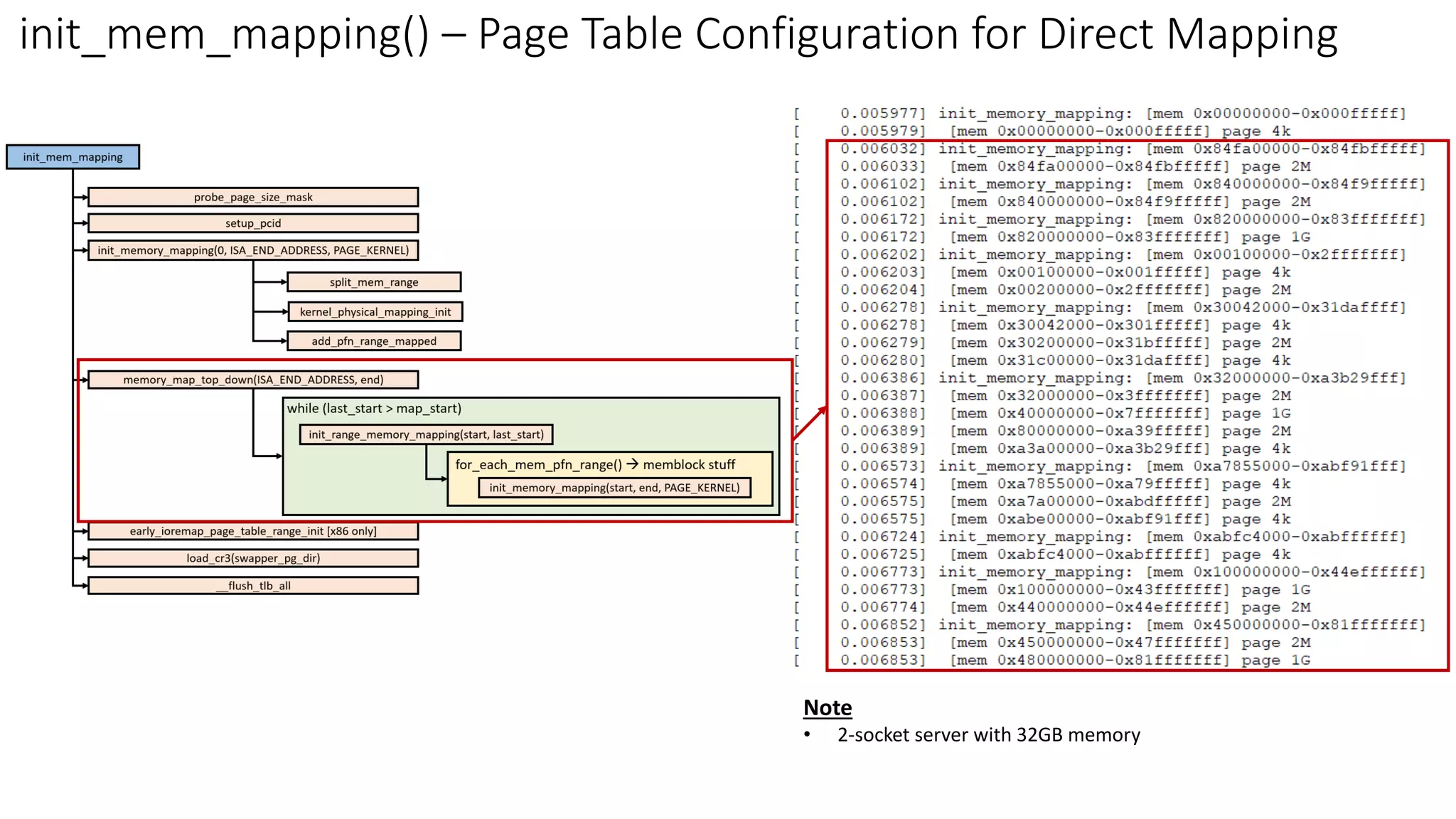
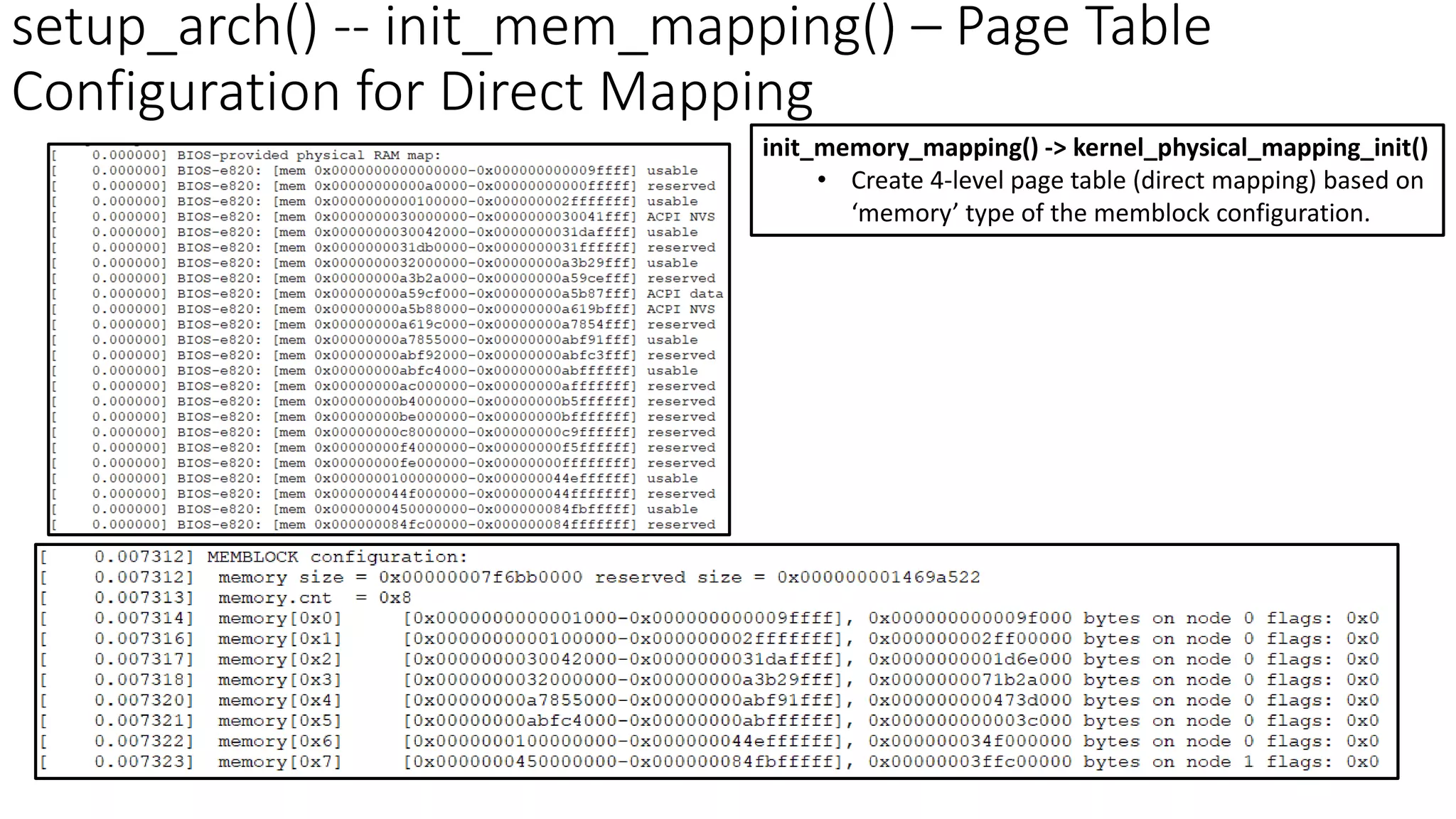
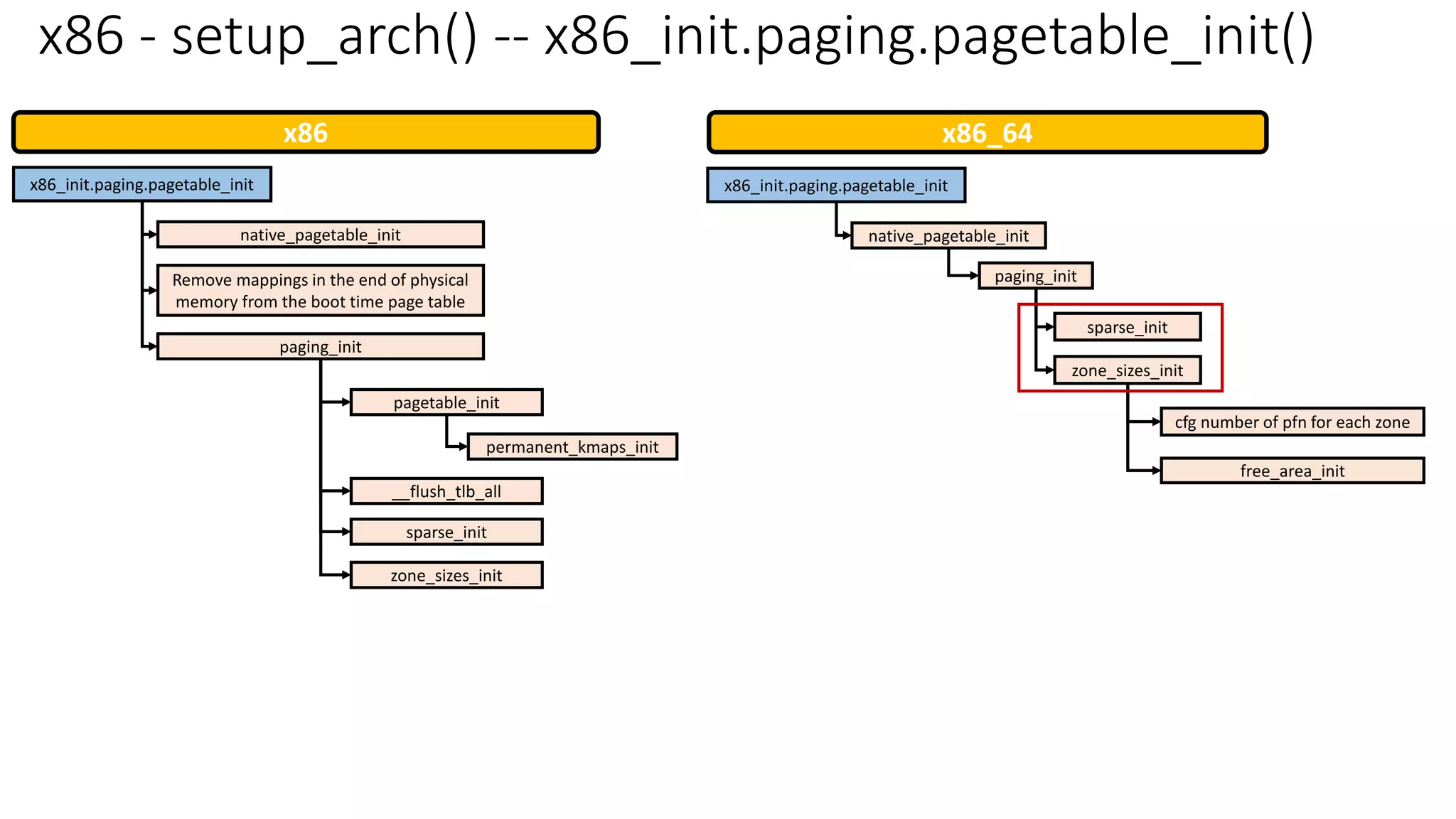
![Sparse Memory Model Initialization: sparse_init()
sparse_init
memblocks_present
pnum_begin = first_present_section_nr();
nid_begin = sparse_early_nid(__nr_to_section(pnum_begin));
for_each_mem_pfn_range(..)
memory_present(nid, start, end)
1. for_each_mem_pfn_range(): Walk through available memory range
from memblock subsystem
Allocate pointer array of section root if necessary
for (pfn = start; pfn < end; pfn += PAGES_PER_SECTION)
sparse_index_init
set_section_nid
section_mark_present
cfg ‘ms->section_mem_map’ via
sparse_encode_early_nid()
for_each_present_section_nr(pnum_begin + 1, pnum_end)
sparse_init_nid
sparse_init_nid [Cover last cpu node]
Mark the present bit for each allocated mem_section
cfg ms->section_mem_map flag bits
1. Allocate a mem_section_usage struct
2. cfg ms->section_mem_map with the valid page descriptor
[During boot]
Temporary: Store nid in
ms->section_mem_map
[During boot]
Temporary: get nid in ms->section_mem_map](https://image.slidesharecdn.com/physicalmemorymodels-220620070231-42aa9f6d/75/Physical-Memory-Models-pdf-20-2048.jpg)
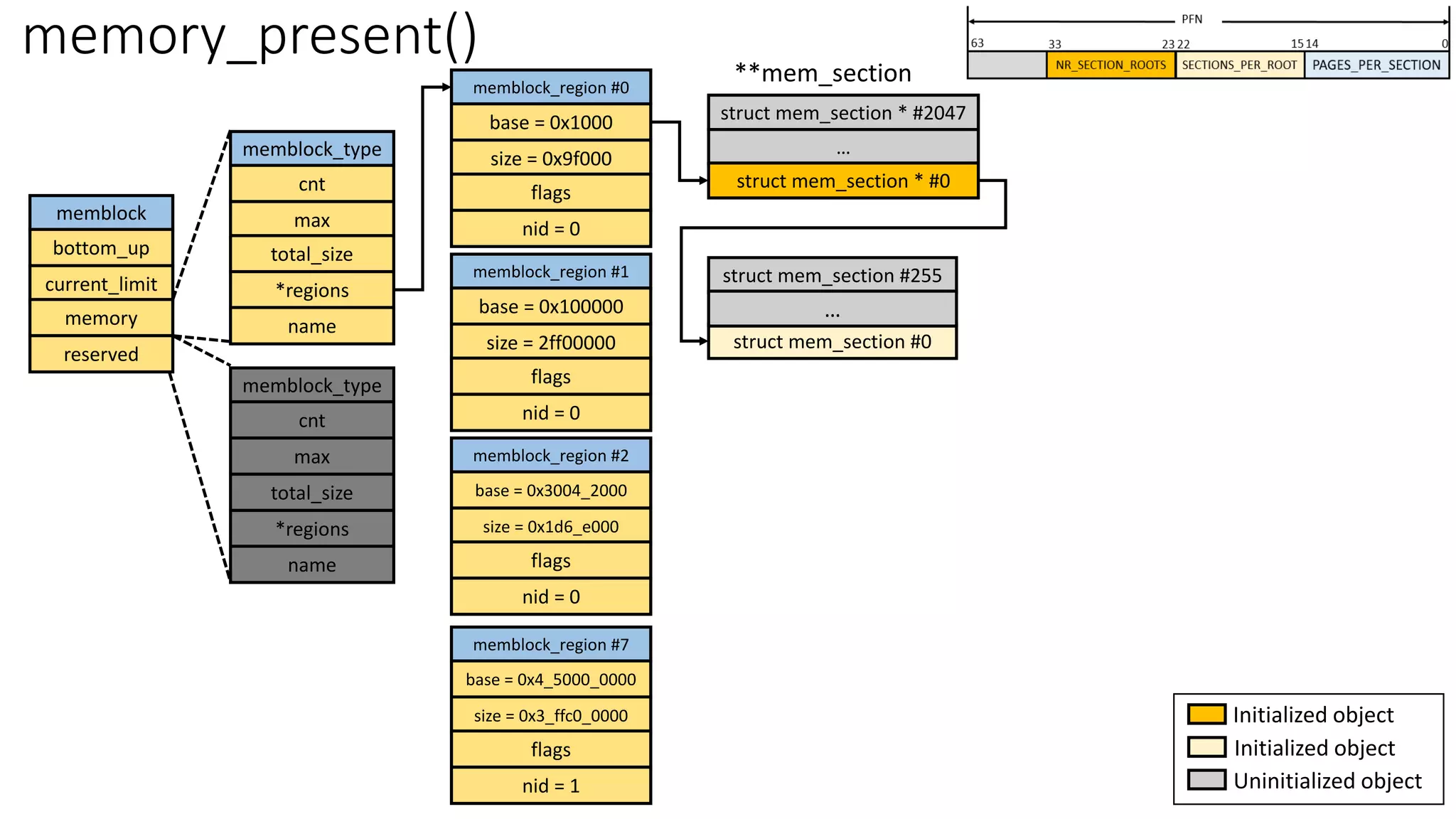
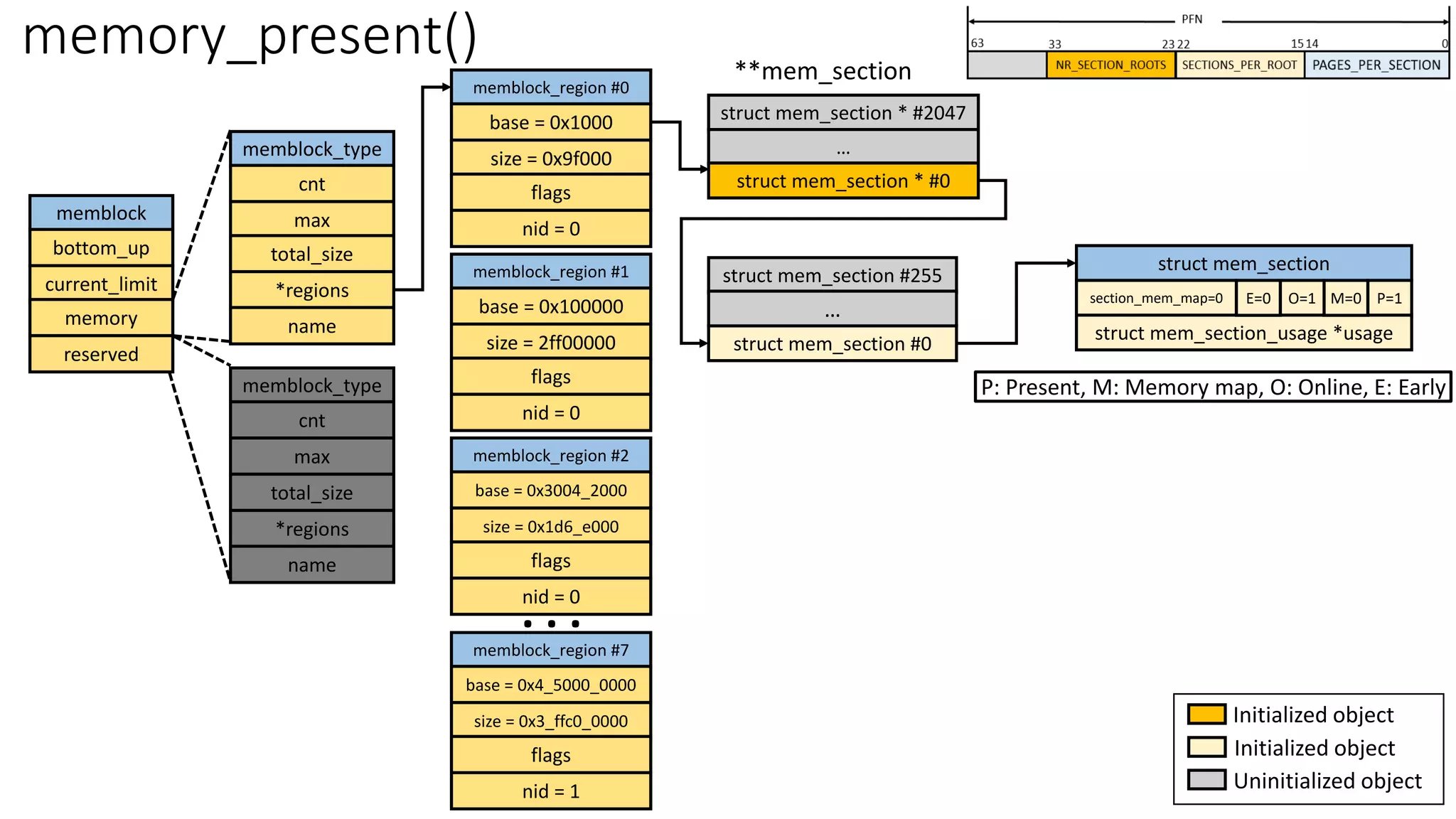
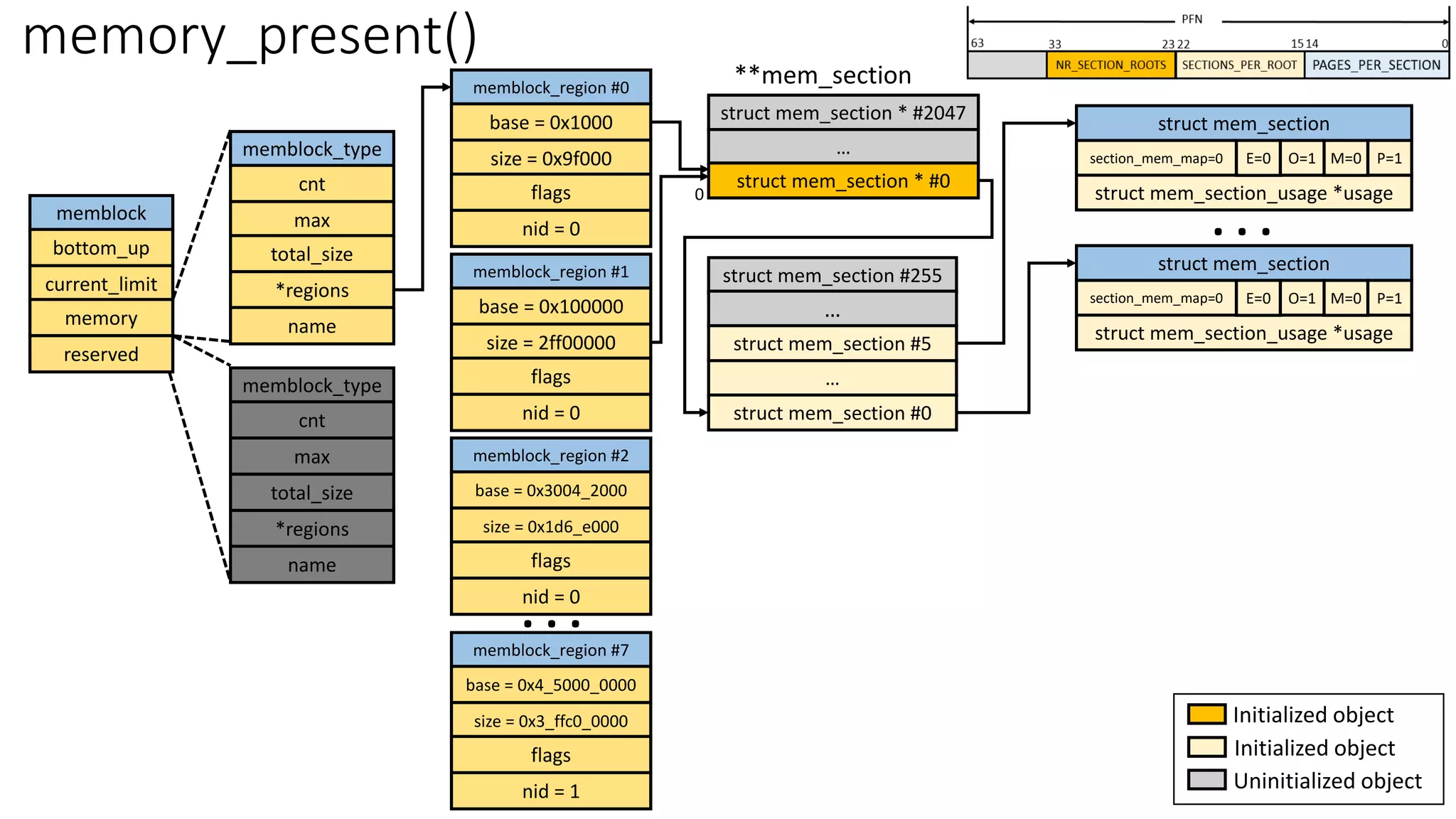
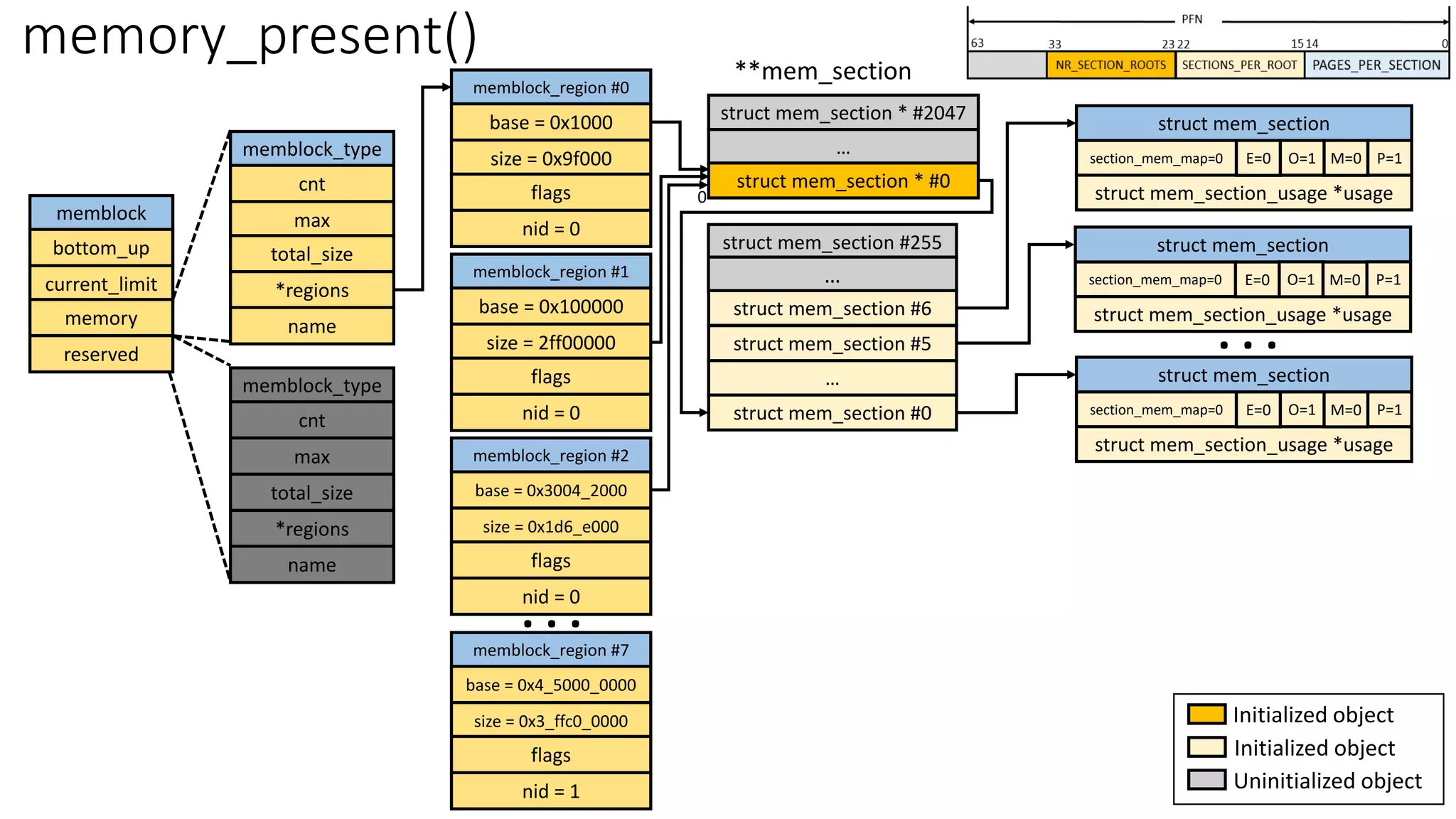

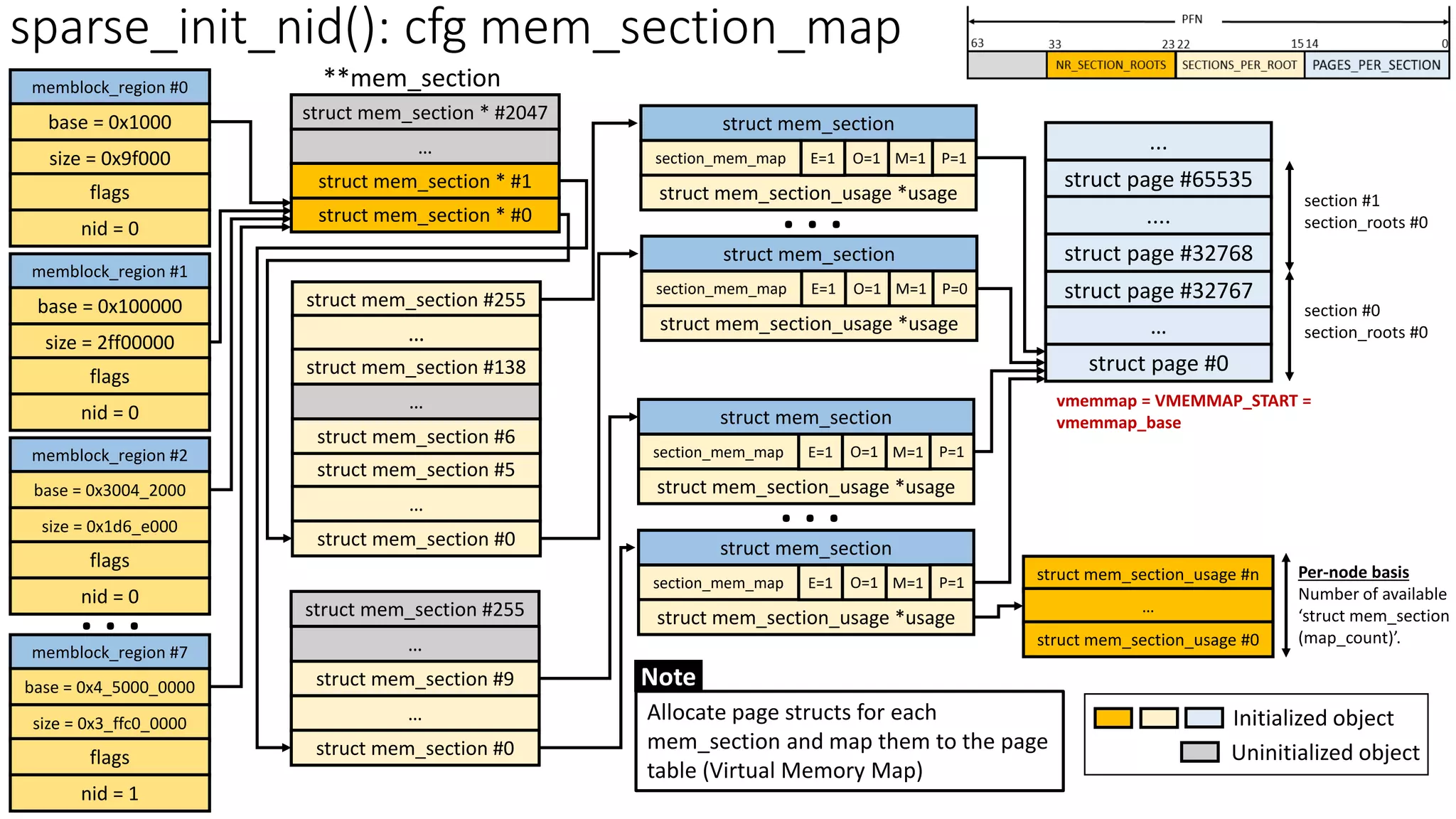
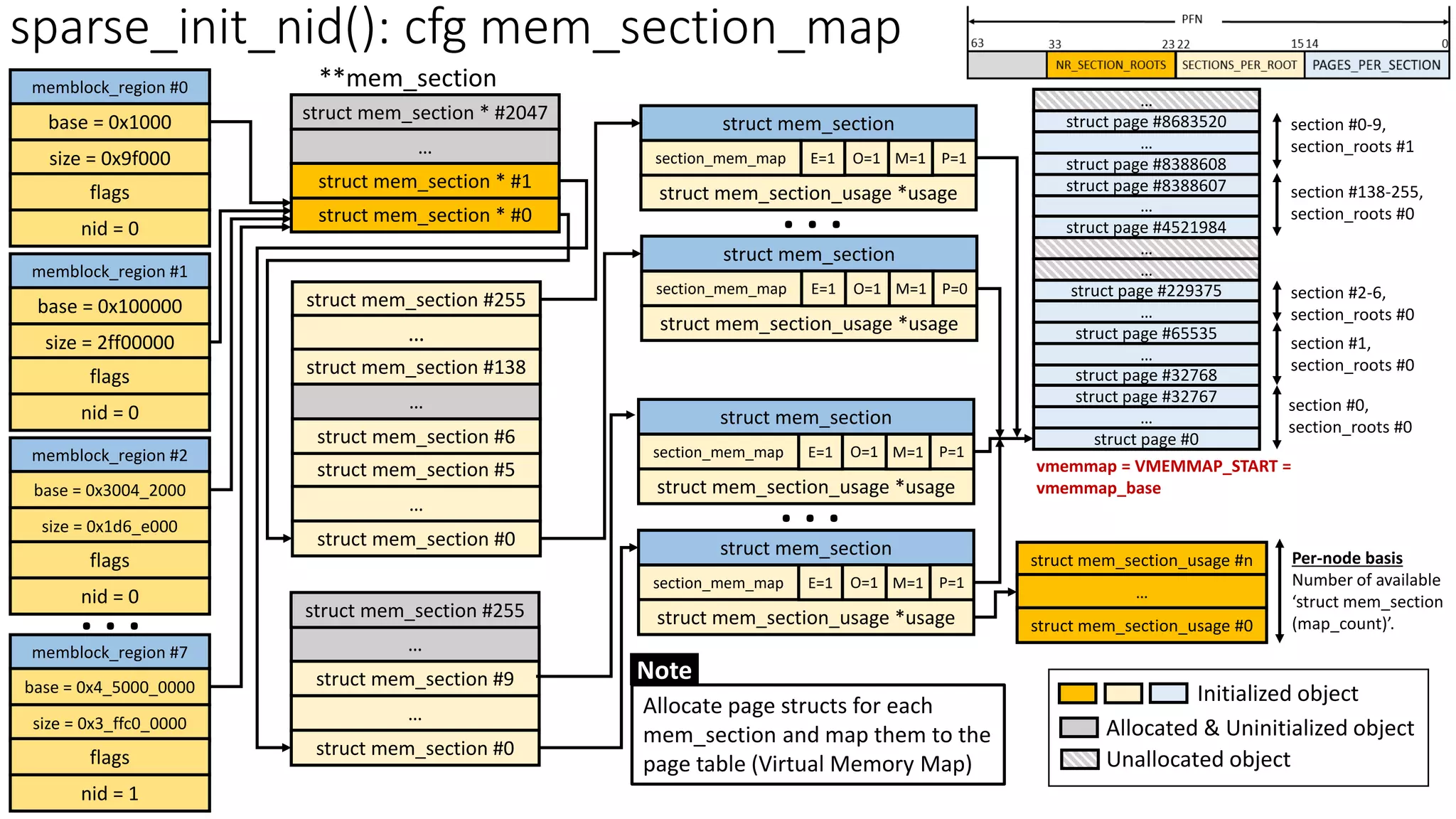
![64-bit Virtual Address
Kernel Space
0x0000_7FFF_FFFF_FFFF
0xFFFF_8000_0000_0000
128TB
Page frame direct
mapping (64TB)
ZONE_DMA
ZONE_DMA32
ZONE_NORMAL
page_offset_base
0
16MB
64-bit Virtual Address
Kernel Virtual Address
Physical Memory
0
0xFFFF_FFFF_FFFF_FFFF
Guard hole (8TB)
LDT remap for PTI (0.5TB)
Unused hole (0.5TB)
vmalloc/ioremap (32TB)
vmalloc_base
Unused hole (1TB)
Virtual memory map – 1TB
(store page frame descriptor)
…
vmemmap_base
64TB
*page
…
*page
…
*page
…
Page Frame
Descriptor
vmemmap_base
page_ofset_base = 0xFFFF_8880_0000_0000
vmalloc_base = 0xFFFF_C900_0000_0000
vmemmap_base = 0xFFFF_EA00_0000_0000
* Can be dynamically configured by KASLR (Kernel Address Space Layout Randomization - "arch/x86/mm/kaslr.c")
Default Configuration
Kernel text mapping from
physical address 0
Kernel code [.text, .data…]
Modules
__START_KERNEL_map = 0xFFFF_FFFF_8000_0000
__START_KERNEL = 0xFFFF_FFFF_8100_0000
MODULES_VADDR
0xFFFF_8000_0000_0000
Empty Space
User Space
128TB
1GB or 512MB
1GB or 1.5GB Fix-mapped address space
(Expanded to 4MB: 05ab1d8a4b36) FIXADDR_START
Unused hole (2MB) 0xFFFF_FFFF_FFE0_0000
0xFFFF_FFFF_FFFF_FFFF
FIXADDR_TOP = 0xFFFF_FFFF_FF7F_F000
Reference: Documentation/x86/x86_64/mm.rst
Note: Refer from page #5 in the slide deck Decompressed vmlinux: linux kernel initialization from page table configuration perspective](https://image.slidesharecdn.com/physicalmemorymodels-220620070231-42aa9f6d/75/Physical-Memory-Models-pdf-28-2048.jpg)
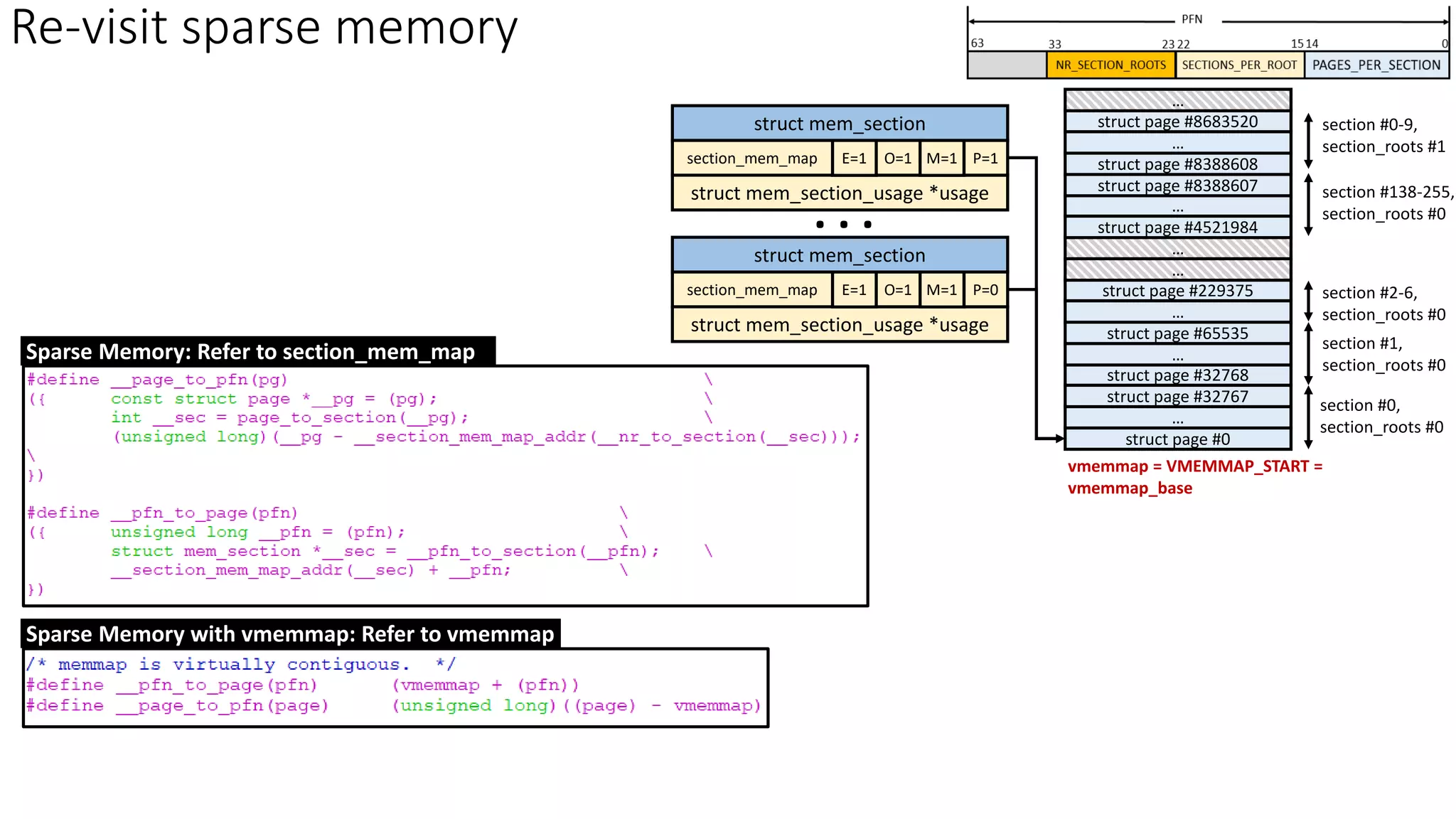

![Sparse Memory Virtual Memmap: subsection (1/4)
SECTIONS_PER_ROOT PAGES_PER_SECTION
0
14
15
22
NR_SECTION_ROOTS
23
33
PFN
63
SECTION_SIZE_BITS = 27
PAGES_PER_SUBSECTION
SUBSECTIONS_PER
_SECTION
14 9 0
8
struct mem_section
section_mem_map
struct mem_section_usage *usage
O=1
E=1 P=1
M=1
subsection #63
…
subsection #0
struct mem_section_usage
subsection_map[1] (bitmap)
pageblock_flags[0]
struct page #0
…
struct page #511
…
…
struct page #32767
struct page #32256
subsection
subsection
section
…
…
• subsection_map: bitmap to indicate if the corresponding subsection is valid
• pageblock_flags: pages of a subsection have the same flag (migration type)
sparsemem vmemmap *only*](https://image.slidesharecdn.com/physicalmemorymodels-220620070231-42aa9f6d/75/Physical-Memory-Models-pdf-31-2048.jpg)
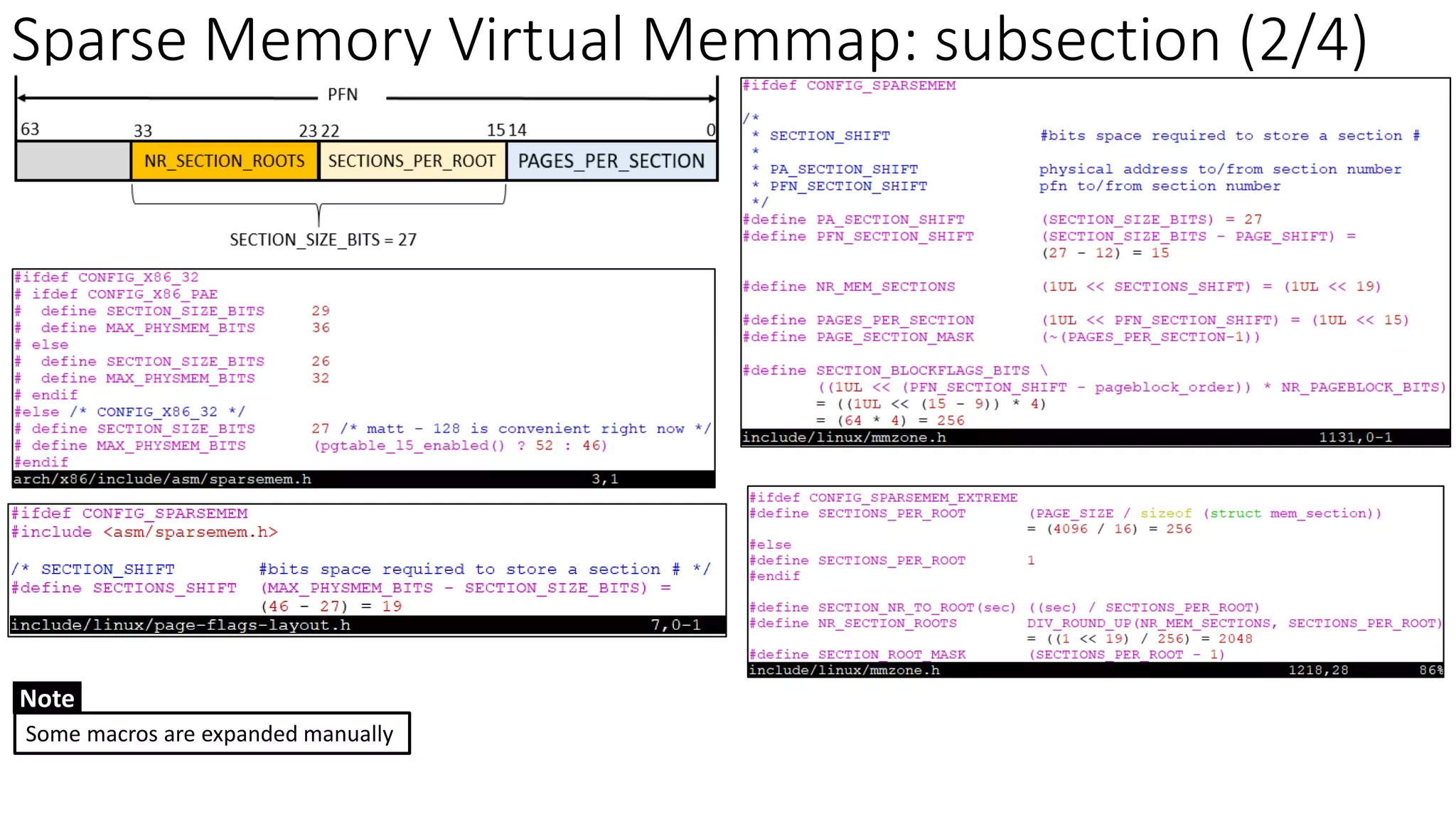
![Sparse Memory Virtual Memmap: subsection (3/4)
SECTIONS_PER_ROOT PAGES_PER_SECTION
0
14
15
22
NR_SECTION_ROOTS
23
33
PFN
63
SECTION_SIZE_BITS = 27
PAGES_PER_SUBSECTION
SUBSECTIONS_PER
_SECTION
14 9 0
8
struct mem_section
section_mem_map
struct mem_section_usage *usage
O=1
E=1 P=1
M=1
subsection #63
…
subsection #0
struct mem_section_usage
subsection_map[1] (bitmap)
pageblock_flags[0]
struct page #0
…
struct page #511
…
…
struct page #32767
struct page #32256
subsection
subsection
section
…
…
• PAGES_PER_SUBSECTION = 512 pages
✓ 512 pages * 4KB = 2MB → 2MB huge page
in x86_64](https://image.slidesharecdn.com/physicalmemorymodels-220620070231-42aa9f6d/75/Physical-Memory-Models-pdf-33-2048.jpg)
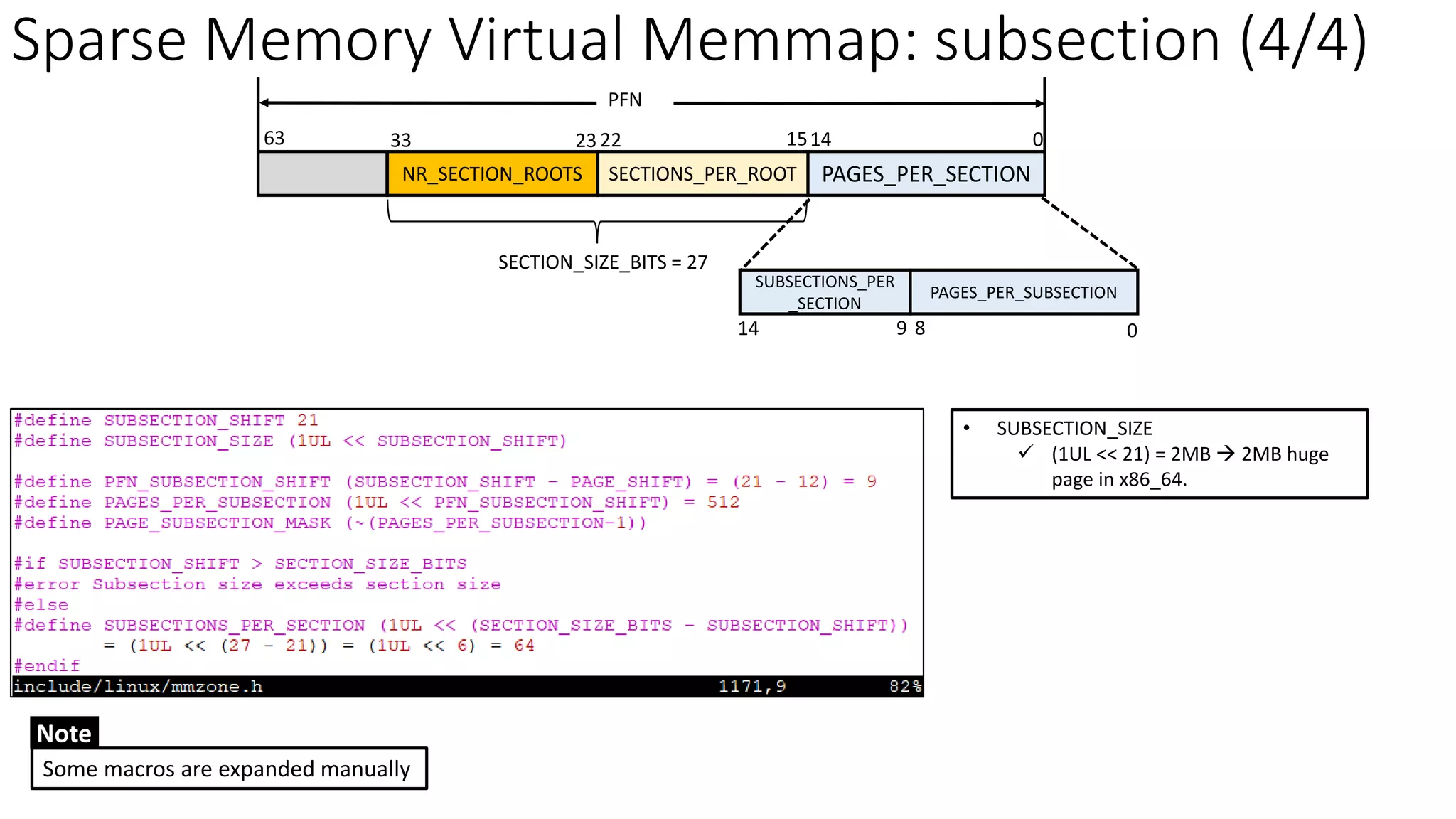
![subsection: subsection_map users?
struct mem_section
section_mem_map
struct mem_section_usage *usage
O=1
E=1 P=1
M=1
subsection #63
…
subsection #0
struct mem_section_usage
subsection_map[1] (bitmap)
pageblock_flags[0]
struct page #0
…
struct page #511
…
…
struct page #32767
struct page #32256
subsection
subsection
section
…
…
• init stage
✓ paging_init -> zone_sizes_init -> free_area_init -> subsection_map_init -> subsection_mask_set
➢ Set the corresponding bit map for the specific subsection
• Reference stage
✓ pfn_section_valid(struct mem_section *ms, unsigned long pfn)
➢ Users
▪ [mm/page_alloc.c: 5089] free_pages -> virt_addr_valid -> __virt_addr_valid -> pfn_valid -> pfn_section_valid
▪ [drivers/char/mem.c: 416] mmap_kmem -> pfn_valid -> pfn_section_valid ➔ /dev/mem (`man mem`)
▪ …
subsection_map users](https://image.slidesharecdn.com/physicalmemorymodels-220620070231-42aa9f6d/75/Physical-Memory-Models-pdf-35-2048.jpg)
![struct mem_section
section_mem_map
struct mem_section_usage *usage
O=1
E=1 P=1
M=1
subsection #63
…
subsection #0
struct mem_section_usage
subsection_map[1] (bitmap)
pageblock_flags[0]
struct page #0
…
struct page #511
…
…
struct page #32767
struct page #32256
subsection
subsection
section
…
…
• Hotplug stage
✓ Add
➢ #A1 [drivers/acpi/acpi_memhotplug.c: 311] acpi_memory_device_add -> acpi_memory_enable_device ->
__add_memory -> add_memory_resource -> arch_add_memory -> add_pages -> __add_pages -> sparse_add_section
-> section_activate -> fill_subsection_map -> subsection_mask_set
➢ #A2 [drivers/dax/kmem.c: 43] dev_dax_kmem_probe -> add_memory_driver_managed -> add_memory_resource ->
same with #A1
✓ Remove
➢ #R1 [drivers/acpi/acpi_memhotplug.c: 311] acpi_memory_device_remove -> __remove_memory ->
try_remove_memory -> arch_remove_memory -> __remove_pages -> __remove_section -> sparse_remove_section ->
section_deactivate -> clear_subsection_map
➢ #R2 [drivers/dax/kmem.c: 139] dev_dax_kmem_remove -> remove_memory -> try_remove_memory -> same with #R1
subsection_map users
subsection: subsection_map users?](https://image.slidesharecdn.com/physicalmemorymodels-220620070231-42aa9f6d/75/Physical-Memory-Models-pdf-36-2048.jpg)
![pageblock_flags: pageblock migration type
struct mem_section
section_mem_map
struct mem_section_usage *usage
O=1
E=1 P=1
M=1
subsection #63
…
subsection #0
struct mem_section_usage
subsection_map[1] (bitmap)
pageblock_flags[0]
struct page #0
…
struct page #511
…
…
struct page #32767
struct page #32256
subsection
subsection
section
…
…
unsigned long pageblock_flags[4]
4-bit MT . . . 4-bit MT
4-bit MT
4-bit MT . . . 4-bit MT
4-bit MT
4-bit MT . . . 4-bit MT
4-bit MT
4-bit MT . . . 4-bit MT
4-bit MT
[0]
Dynamically allocated
[1]
[2]
[3]
subsection #0: Migration Type
subsection #16: Migration Type
subsection #32: Migration Type
subsection #48: Migration Type
Migration type is configured in setup_arch -> … -> memmap_init_zone](https://image.slidesharecdn.com/physicalmemorymodels-220620070231-42aa9f6d/75/Physical-Memory-Models-pdf-37-2048.jpg)
![pageblock_flags: pageblock migration type
struct mem_section
section_mem_map
struct mem_section_usage *usage
O=1
E=1 P=1
M=1
subsection #63
…
subsection #0
struct mem_section_usage
subsection_map[1] (bitmap)
pageblock_flags[0]
struct page #0
…
struct page #511
…
…
struct page #32767
struct page #32256
subsection
subsection
section
…
…
unsigned long pageblock_flags[4]
4-bit MT . . . 4-bit MT
4-bit MT
4-bit MT . . . 4-bit MT
4-bit MT
4-bit MT . . . 4-bit MT
4-bit MT
4-bit MT . . . 4-bit MT
4-bit MT
[0]
Dynamically allocated
[1]
[2]
[3]
subsection #0: Migration Type
subsection #16: Migration Type
subsection #32: Migration Type
subsection #48: Migration Type](https://image.slidesharecdn.com/physicalmemorymodels-220620070231-42aa9f6d/75/Physical-Memory-Models-pdf-38-2048.jpg)
![pageblock: set migration type
free_area_init
print zone ranges and early memory node ranges
for_each_mem_pfn_range(..)
print memory range for each memblock
subsection_map_init
mminit_verify_pageflags_layout
setup_nr_node_ids
init_unavailable_mem
for_each_online_node(nid)
free_area_init_node
node_set_state
check_for_memory
get_pfn_range_for_nid
calculate_node_totalpages
pgdat_set_deferred_range
free_area_init_core
free_area_init_core
memmap_init
for (j = 0; j < MAX_NR_ZONES; j++)
memmap_init_zone
subsection_map_init
subsection_mask_set
for (nr = start_sec; nr <= end_sec; nr++)
bitmap_set
calculate arch_zone_{lowest, highest}_possible_pfn[]
for (pfn = start_pfn; pfn < end_pfn;)
set_pageblock_migratetype
__init_single_page
set_pageblock_migratetype
• [System init stage] each pageblock is initialized to MIGRATE_MOVABLE](https://image.slidesharecdn.com/physicalmemorymodels-220620070231-42aa9f6d/75/Physical-Memory-Models-pdf-39-2048.jpg)
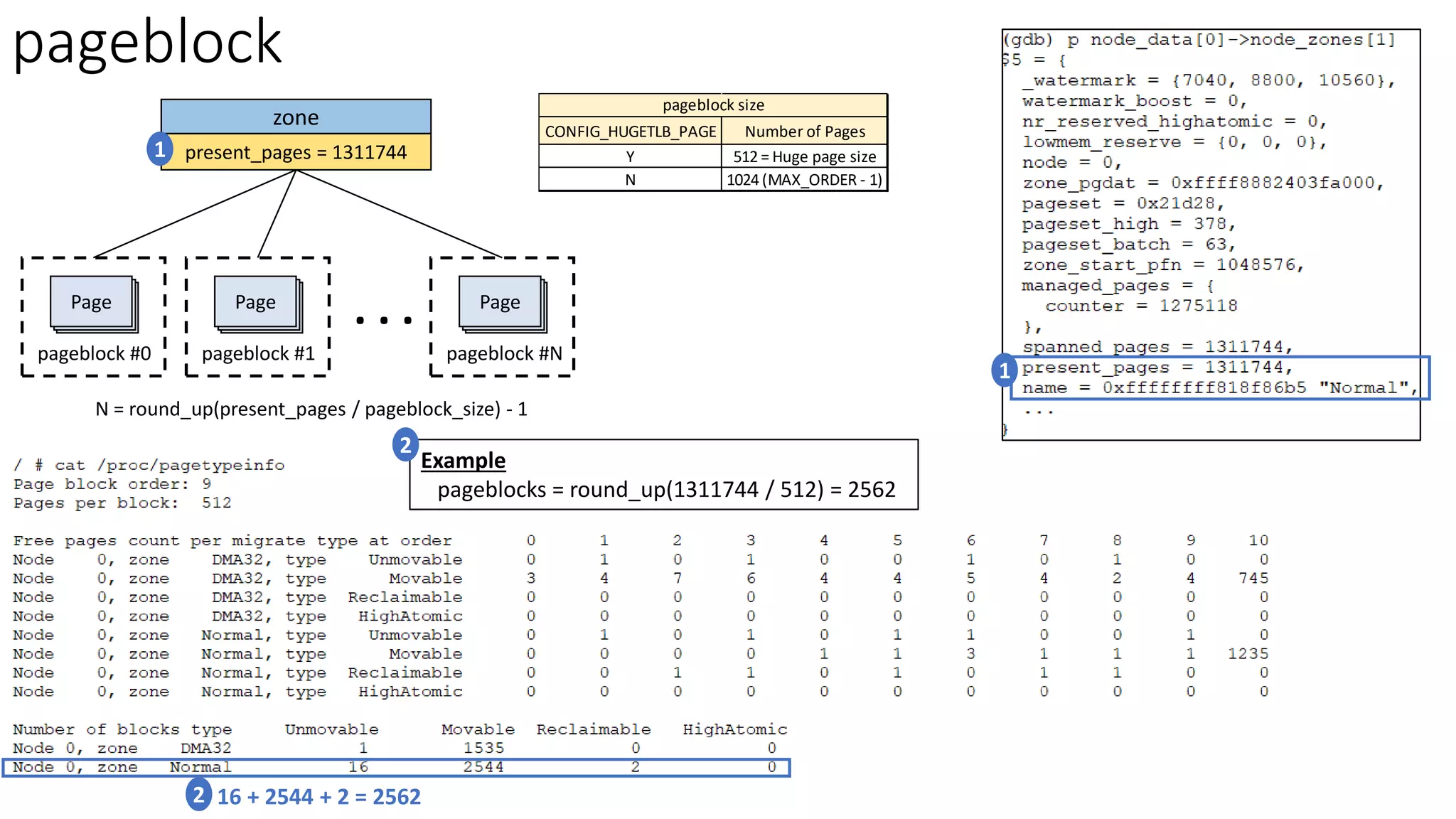
![pageblock_flags: pageblock migration type
struct mem_section
section_mem_map
struct mem_section_usage *usage
O=1
E=1 P=1
M=1
subsection #63
…
subsection #0
struct mem_section_usage
subsection_map[1] (bitmap)
pageblock_flags[0]
struct page #0
…
struct page #511
…
…
struct page #32767
struct page #32256
subsection
subsection
section
…
…
unsigned long pageblock_flags[4]
4-bit MT . . . 4-bit MT
4-bit MT
4-bit MT . . . 4-bit MT
4-bit MT
4-bit MT . . . 4-bit MT
4-bit MT
4-bit MT . . . 4-bit MT
4-bit MT
[0]
Dynamically allocated
[1]
[2]
[3]
subsection #0: Migration Type
subsection #16: Migration Type
subsection #32: Migration Type
subsection #48: Migration Type
[CONFIG_HUGETLB_PAGE=y]
pages of subsection = pages of pageblock = 512 pages (order = 9)](https://image.slidesharecdn.com/physicalmemorymodels-220620070231-42aa9f6d/75/Physical-Memory-Models-pdf-41-2048.jpg)

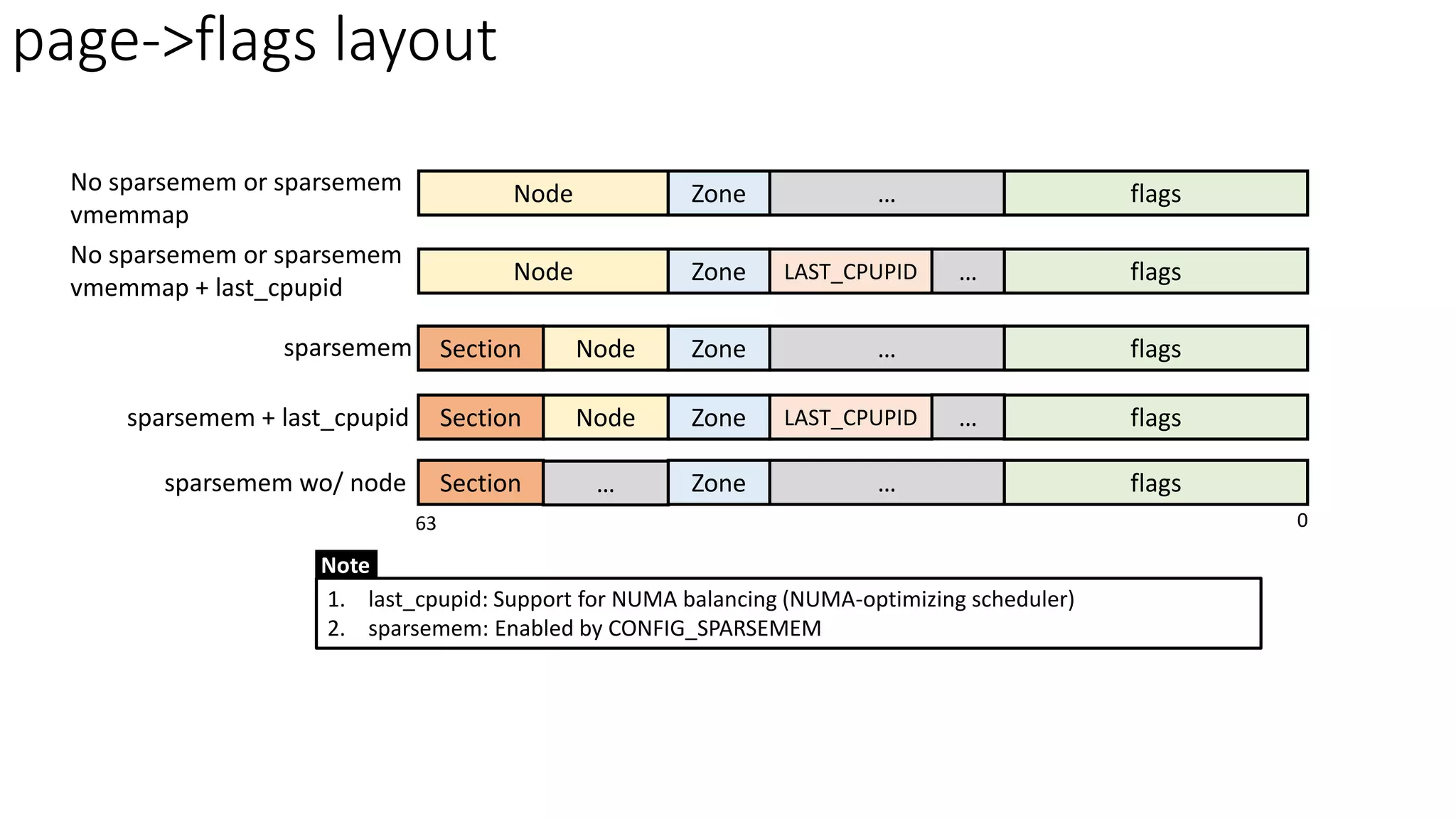
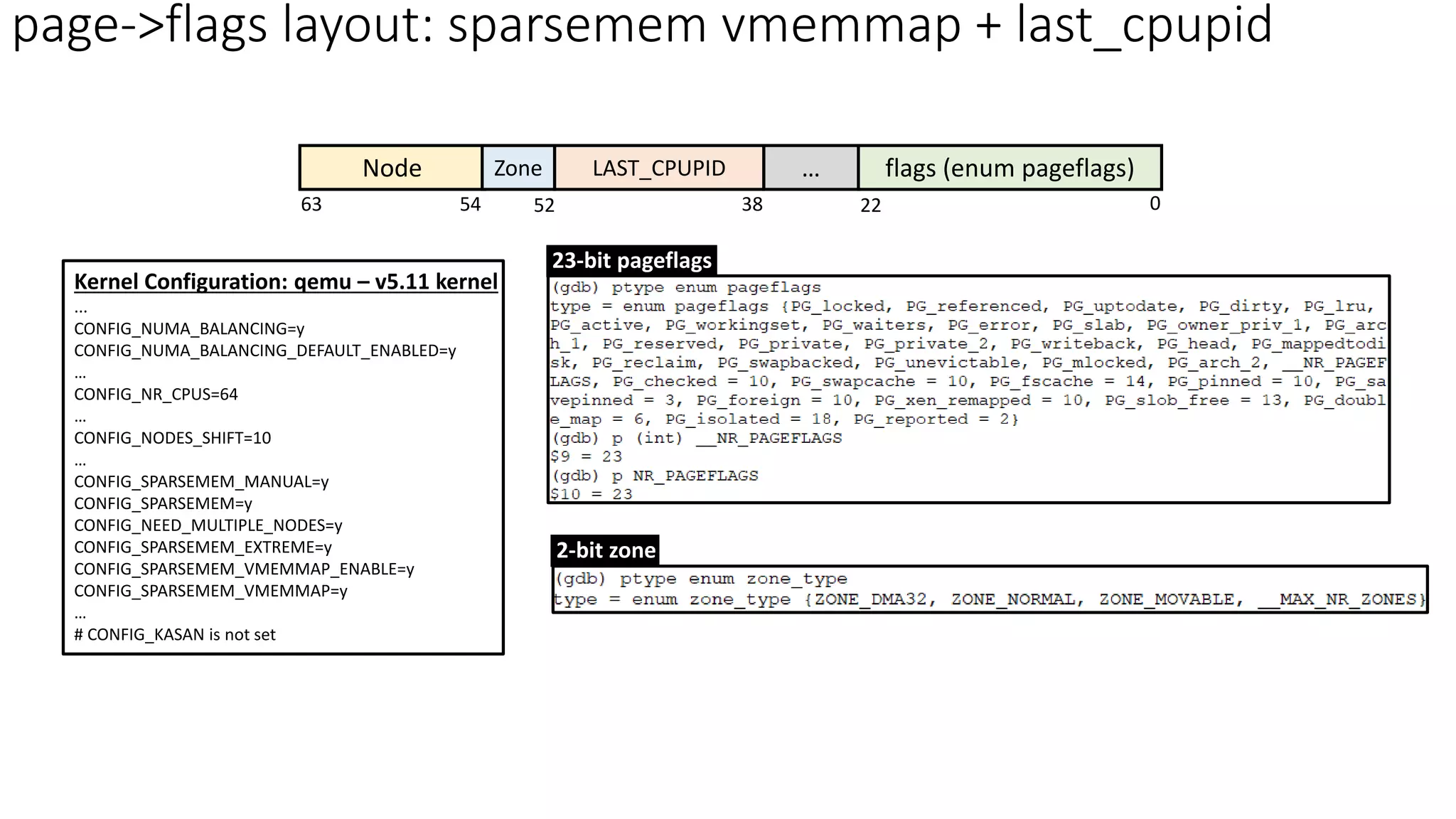

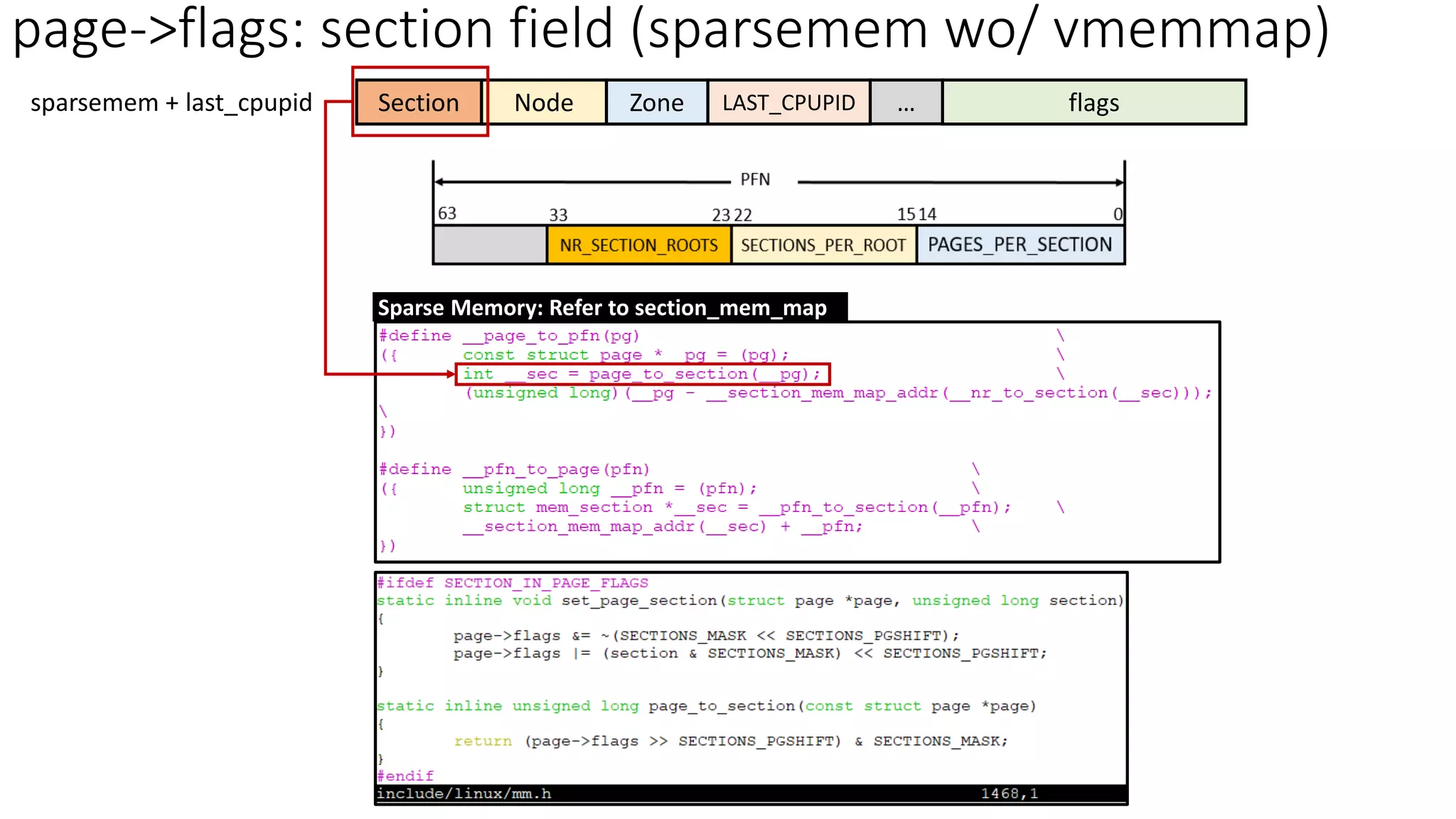
![Memory Model – Sparse Memory (sparsemem wo/ vmemmap)
struct mem_section
page frame
....
page frame
Physical Memory
**mem_section
struct mem_section
struct mem_section
…
struct mem_section *
page frame
....
page frame
....
struct page #0
struct page #n
....
struct page #0
Node #1
(hotplug)
Node #0
…
struct mem_section *
1. [section_mem_map] Dynamic page structure: pre-allocate page structures based on the
number of available page frames
✓ Refer from: memblock structure
2. Support physical memory hotplug
3. Minimum unit: mem_section - PAGES_PER_SECTION = 32768
✓ Each memory section addresses the memory size: 32768 * 4KB (page size) = 128MB
4. [NUMA] : reduce the memory hole impact due to “struct mem_section”
Note
struct page #m+n-1](https://image.slidesharecdn.com/physicalmemorymodels-220620070231-42aa9f6d/75/Physical-Memory-Models-pdf-47-2048.jpg)


